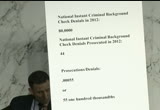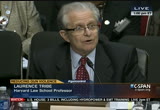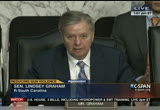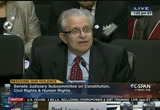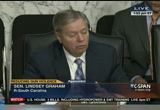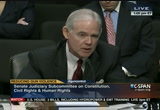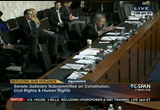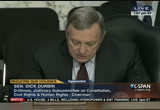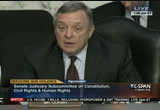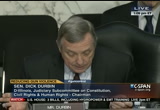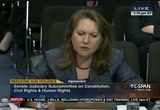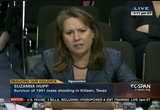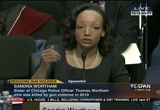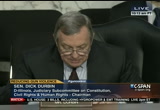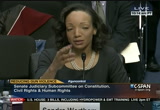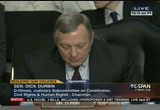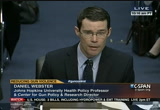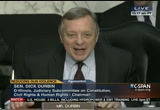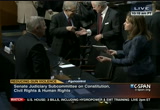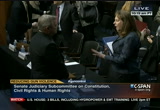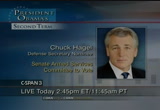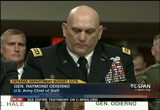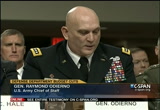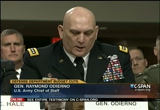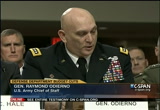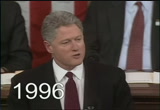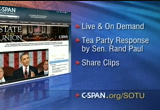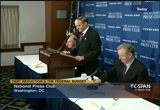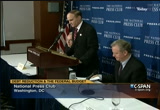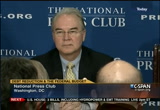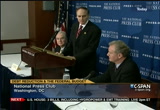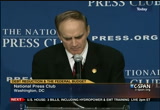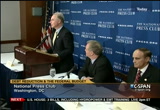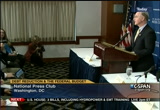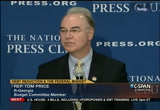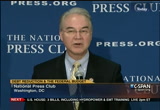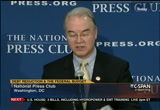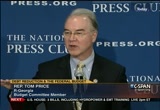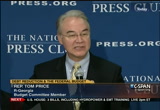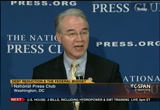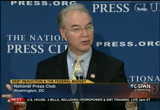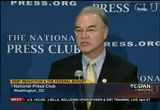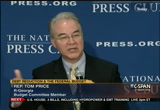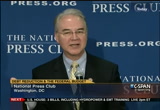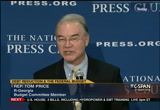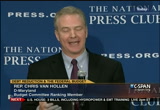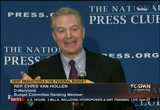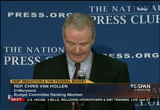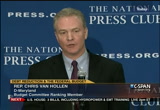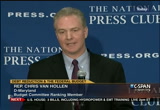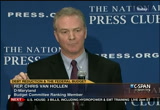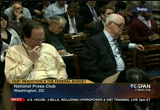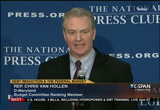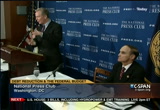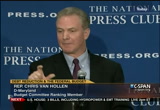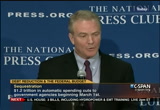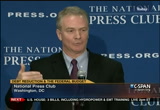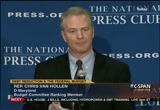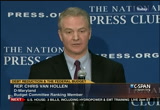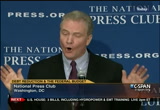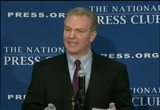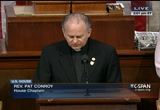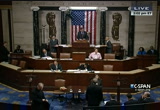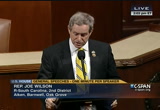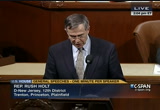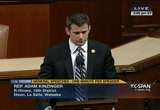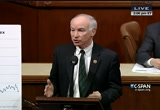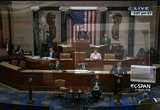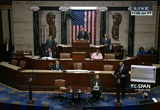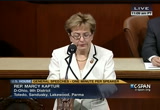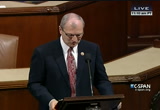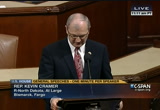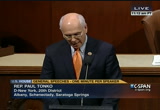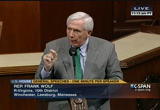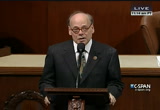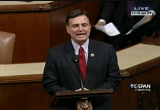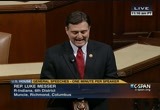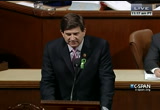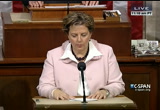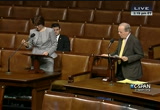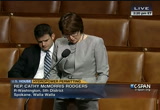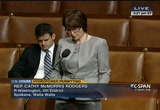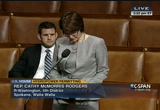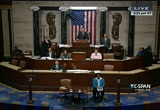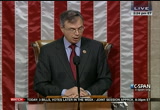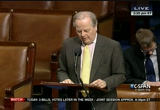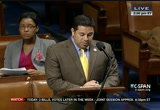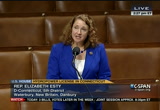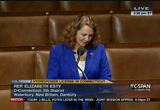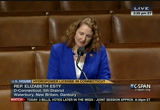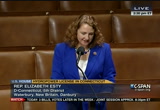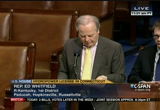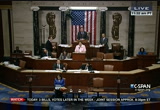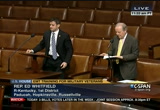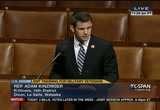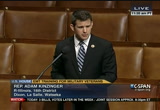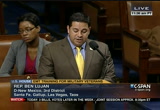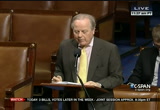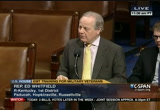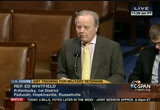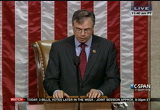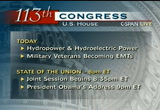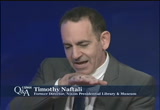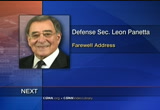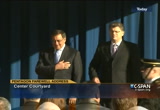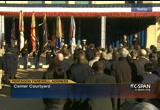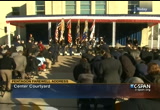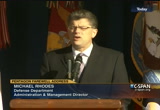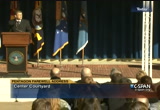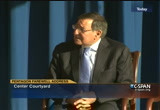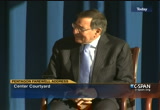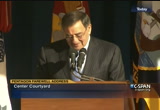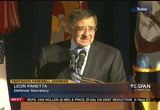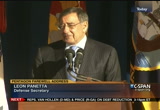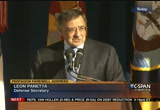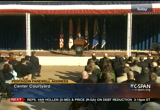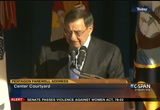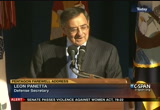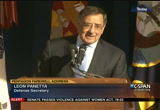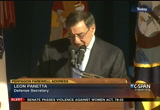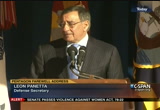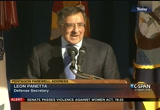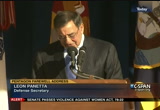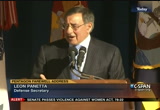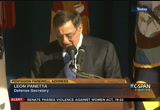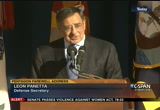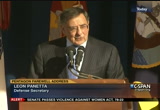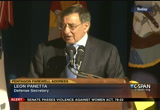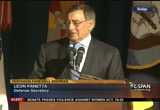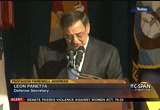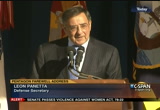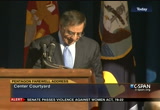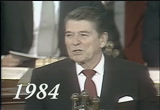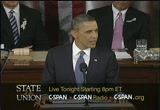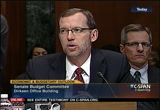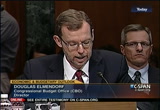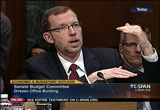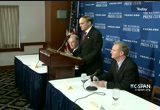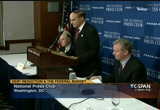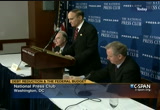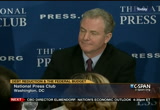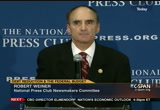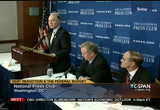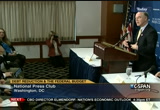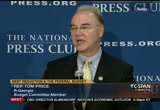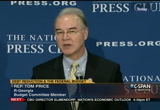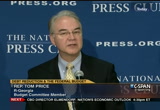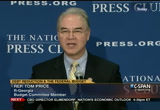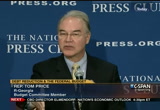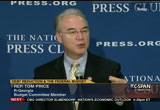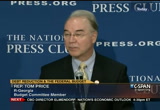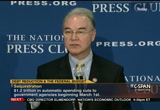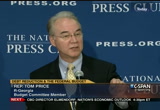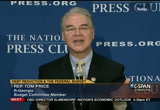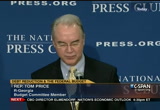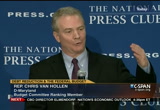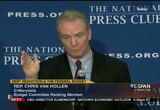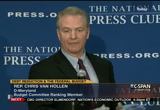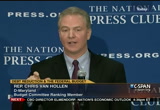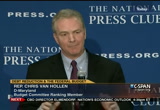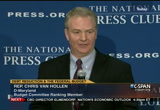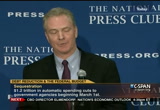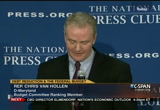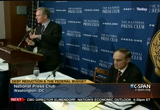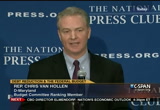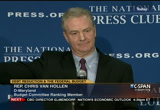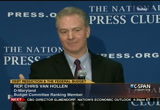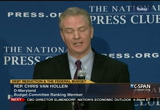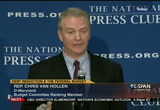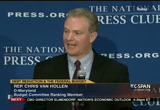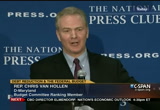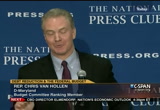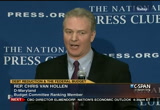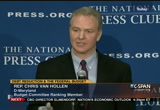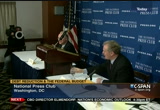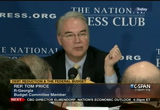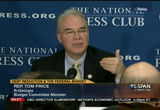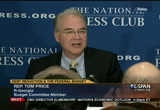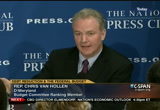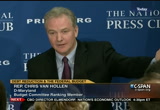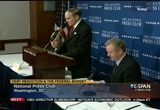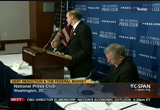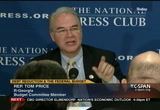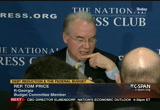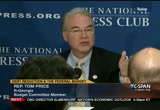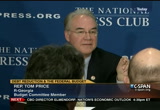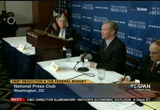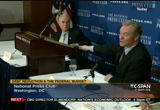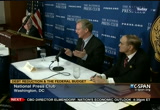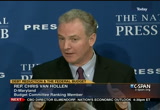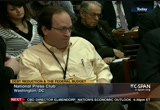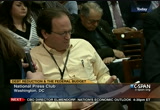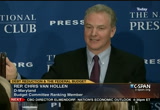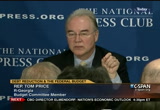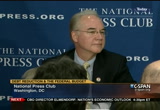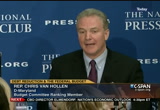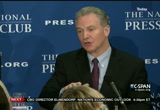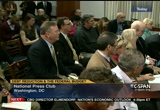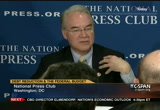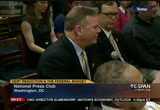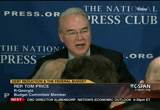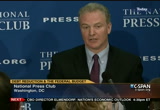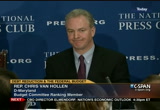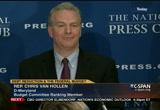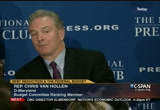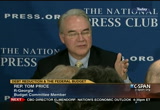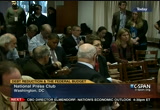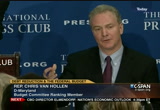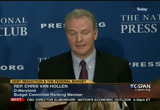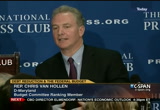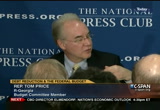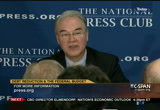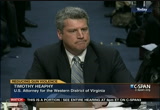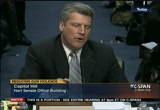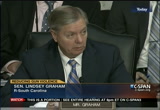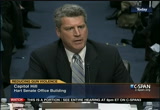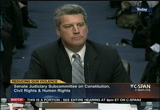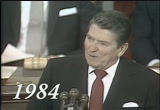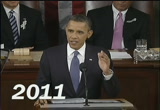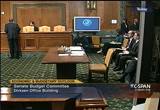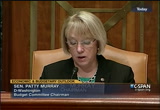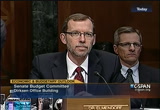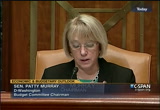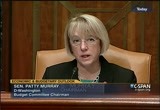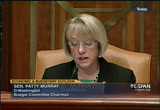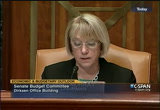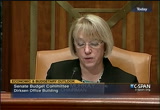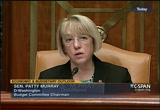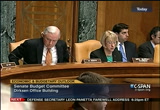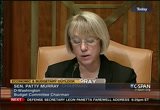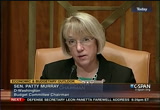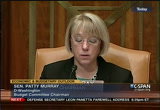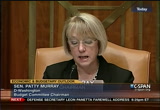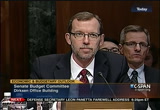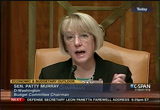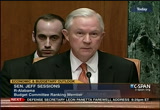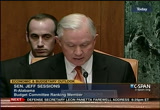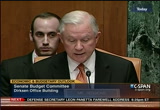tv Public Affairs CSPAN February 12, 2013 1:00pm-5:00pm EST
1:00 pm
1:02 pm
constitutional parameters of what you can do up here to regulate gun ownership, one is common usage over -- >> right. the two others, senator graham. thank you for giving me a chance to get to them. that is not simply another way of saying common use. of course, all guns are dangerous or they would be useless. but a gun that can spray bullets without being reloaded is more dangerous. and the third criterion was how vital it is to self-defense. now, none of those things can be answered in a kind of easy, black and white way, because in a sense the more dangerous a gun is the more useful it also is for self-defense. >> that's a good point. i guess that's what i'm trying
1:03 pm
to tell the public. could you put up our chart up -- about different guns? i think we all agree that any weapon, one bullet in the hands of a mentally unstable person is one too many, do you agree with that concept? any gun should be denied someone who's mentally unstable? >> yeah. >> i do. >> i think everybody would. and we don't want felons because that's already the existing law. now, a circumstance you've described, the circumstance you found yourself in. there is a case in atlanta recently, dr. tribe are of a lady -- of a lady who was defending her home against a home invader. she was home with twin daughters. she ran up to the closet. she was on the phone to her husband. the guy followed up the steps, broke into the closet. she had a six-shot reinvolver. she emptied the gun hitted five
1:04 pm
of the six shots. he was able to get up and drive away. i've been told that 1/3 of all attacks involve more than two people. so is it unfair for congress to say that in the hands of a mother defending her children against a home invader six rounds may not be enough, 10 rounds may not be enough, in that situation i wish she had 15 or more because six rounds were not able to do the job, does that make sense to you how i can think that way? >> well, it makes a certain kind of since, senator graham. it has an argument that has no limit. because if she had a machine gun she might have been even safer. if she had a hand grenade -- >> again, blow them all out of the water. >> here is how democracy works. i don't want her to have a machine gun or hand grenade. i don't want her to be limited to 10 bullets when the real world -- everything is a
1:05 pm
balance -- she may need more than 10 and the mentally unstable person doesn't need more than one. now, the second series of weapons, after natural disasters you've had mobs roam around areas that are lawless. basically there's no power. the police can't get there. katrina, sandy, haiti, you name it. but you got three homes. one home, the homeowner has no gun. the second home has a shotgun. the third home have an ar-15. mr. cooper, what home do you think would be best protected? >> i'd rather be in the home that las the ar-15, senator graham, but shotgun can come in very handy as well. and i think that your comments about the atlanta episode really bring into very sharp focus why this magazine ban is so misguided in addition to --
1:06 pm
>> high capacity magazines out on the market, right? >> there are. >> criminals are likely to get them no matter what we do up here? >> they will undoubtedly get them. >> and the only person that could be really affected is the law-abiding person who could be limited, does that make sense? >> absolutely. >> we could be in disagreement of how far the second amendment goes. and there are limits like freedom of speech. i hope the committee will understand a good place to start, mr. chairman, is taking the laws we have and bring about a sense of you better not violate that law because something bad will happen to you. when you're at 55 of .0001 -- >> i know it's tough on our schedule, tough on your schedule but thank you for being part of this important schedule. your story about your parents is heartbreaking and touching, really. as i agree with senator cruz. it's something that everyone
1:07 pm
should hear even those who weren't here today. i would like to ask a couple questions about some things that you said. you stated again what you said before that nearly all mass shootings in recent years occur in gun-free zones. the mayors against illegal guns did an analysis of every reported mass shooting defined by the f.b.i. as involving four or more people being killed. between january, 2009, and january of this year, of the 43 mass shootings by f.b.i. definition, 14 of those mass shootings, about a third, took place in public places that were considered gun-free zones. one-third gun-free zones. the rest took place in private homes or public places where concealed carry was permitted. in light of this analysis, do you still stand by your statement that, quote, nearly all mass shootings in recent
1:08 pm
years have occurred in gun-free zones? >> yes, i would. and the reason i say that is because i'd like to know what the numbers are. you mentioned four or more being called a mass shooting. >> by f.b.i. definition. >> when you and i hear about when we turn on the news are more like 10 or more or six or seven or more. and in all of those cases that i can think of, they have occurred in places where guns were not allowed. and i believe -- my belief is that the four or five category that you're talking about, that has a different intent behind it. you mentioned they were typically in homes? >> no. it took place in private homes or public places where con seal-carry was permitted. >> in a private home situation i'm assuming that most of those will be cases where you have some family member who's gone by zerk and i believe it's a different -- bezerk and i
1:09 pm
believe it's a different scenario. the one thing i can assure you, having a gun is not going to prevent somebody coming in and shooting their estranged wife and the person sitting next to them. it's not. but it will prevent the high body bag count. >> illinois has the distinction, my own state, of the last state in the union without a conceal-carry law. they're currently debating it in the general assembly, and there are a lot of choices to make in terms of conceal-carry. the violence policy center reported that since may of 2007 there have been at least 499 people, including 14 law enforcement officers, shot and killed either by concealed carry permit holders or by gunmen in the four states where there's no permit at all required. these shootings include incidents such as june 6, 2010, the murder of four women in hialeah, florida, by a man who reportedly served time in a cuban prison but had a
1:10 pm
concealed carry weapon under florida law. the april 4, 2009, killing of three pennsylvania police officers by a white supremacist who had a concealed carry permit, even though a former girlfriend had a protection order against him. in july 23, 2011, murder of five people at a roller rink in grand prairie, texas, your home state, by a gunman who was a reported domestic abuser and was carrying a concealed weapon legally under texas law. so i just -- like to ask you this question. what standards can we, should we apply to concealed carry permitholders to avoid abuses such as these? >> that's a wavey question. when you were referring to the roller rink i thought of our local roller rink, and the owner actually requires that all of his employees carry to prevent just that scenario.
1:11 pm
i will have to revert back to what i said earlier. a gun is not a guarantee. it just changes the odds. and it's a tool that can be used to kill a family or a tool that can be used to protect the family, but it seems to me that you all are focusing on the tool. if i were to take -- and i hate to say this out loud honestly, because i have children in a public school. but is there any doubt in anyone's mind that the maniac that went into the sandy hook elementary could not have murdered as many children if he had carried a samurai sword? my contention is that guns are very effective tools, and in the right hands can prevent some dreadful things. >> so your experience with your brother, a law enforcement officer who was armed, your father nearby with a gun and sadly despite that your brother
1:12 pm
lost his life. you've heard this argument now on both sides. and where do you come down on this? how do you -- as you reflect on this. >> well, perspective is everything. i think ms. hupp's story is horrible. i was telling her at the break that i read it and i was traumatized. i think what we know, as i said in my statement, is they were both armed and one was dead. it's true. it betters your odds sometimes. but i also think we are not focused on the big picture here. and i think that's what kind of concerns me. it isn't about disarming law-abiding people. we're talking about doing our best to keep the guns away from people who should never have them in the first place, right? so i feel like we're going off track a lot here with the focus on people should have guns. people should have guns. i don't think anyone is saying
1:13 pm
there shouldn't be a right to bear arms. i think what we're saying here that the second amendment doesn't prevent us, you, the law-making body here, from looking at ways that we know we can try and reduce the amount of people who shouldn't have guns from having them. so the situation like ms. hupp's, like ours wouldn't see them as much. that's more than saying, yeah, guns are helpful sometimes. they sure are. >> your case, i read about and you told quite a bit about, there's still some elements i'd like to put in the record. none of the four suspects who were involved in your brother's murder was eligible to buy a handgun. three were under the age to buy a legal gun and another served six years in prison from a gun charge. these suspects didn't try to buy a handgun from a licensed seller. that's the conclusion we reached. they bought a traffic gun from a private seller on the streets. so in general, do you think
1:14 pm
that ineligible buyers are deterred from trying to get guns from licensed gun dealers because of the face they are going to face a background check? >> i think that's definitely helpful, yes. i think they go the way that they know they won't have to be subjected to that, so yes. >> even going back to senator graham's prosecution numbers and we started the hearing talking about these are paperwork crimes and often don't carry strong penalties and the prosecutor has limited resources to apply to enforcing the law and so forth, i think it is fairly obvious and rational to believe some of these gang bangers are never going to walk into gun dealers. >> with all due respect to senator graham the part we missed with the chart. yeah, maybe the prosecution of those who are flagged not eligible for guns is not what we would like it to be, but we miss the fact that they were flagged as not eligible for guns. so the tool is still in effect
1:15 pm
to deter. that part is not displayed in the chart of the numbers of the maybe not so great prosecution numbers. so i think we miss that in depicting the numbers that way. >> professionor webster, one of the things i find interesting is the hands off attitude that congress takes to many of these gun issues. to think of the number of americans who die from violent gun crime and the like and the fact we have expressly prohibited certain agencies of government of doing any research into gun violence, how to reduce it, we don't think twice about reducing -- calling for research in reducing epidemics and reducing the incidents of disease. can you talk from a public health perspective about the problem of gunshot deaths in our country and what you think we need to do to address it? >> sure. as i indicated in my testimony, i think from a policy standpoint, really the most important thing is that we
1:16 pm
currently make it way too easy for criminals to get guns. and there are some commonsense ways to address that. we need comprehensive background checks. we are never going to be effective without that. as is indicated by the numbers, it's difficult to prosecute them and that's frankly by design. the laws are written in a way to minimize accountability for those who are buying and selling firearms. i think that's very wrong-headed. i have several studies that i've conducted that showed very consistent evidence that states that have greater measures to hold firearm sellers and purchasers accountable have substantially less diversion of guns to criminals. they also happen to enjoy some of the lowest rates of firearm mortality among the 50 states. so i think there are things we
1:17 pm
can do, again, that focus on really what most of us agree upon. none of us want dangerous people to have guns. yet, congress is currently given us a set of laws that make it very difficult for law enforcement to do what we want them to do which is keep guns out of the hands of dangerous people. >> thank you, professor webster. i want to thank the panel for your patience and fore barnes as we raced around during our roll calls. the record will be open for a few days. professor tribe, you know this. you are a regular. there may be questions sent your way and i hope if you can that you respond it promptly. there's a lot of interest in this subject and in this hearing. more than 20 individuals submitted written testimony. i'm supposed to be handed a prop and show you a stack of them. i'll skip that. without objection, i'm going to ask the statements be placed in the record. we are going to keep the record open for a week. written questions may be
1:18 pm
1:20 pm
>> all of this hearing later in our video library on c-span.org and in our program schedule. pretty busy day for senate hearings on capitol hill. the armed services committee will gavel back in this afternoon to consider the nomination of chuck hagel for defense secretary. he's a twice wounded vietnam combat veteran and former nebraska senator. we'll have live coverage of that meeting at 2:45 eastern. if the committee votes and approve the senate nomination, harry reid said he'd like a full senate vote either wednesday or thursday. the armed services committee met this morning to look at the upcoming sequester. those automatic defense cuts set to happen march 1. and they heard from among others the chairman or the joint chiefs of the -- the chief of staff of the army, general ray odierno. >> the fiscal outlook, which the army faces in fiscal year threen and to my hodge -- 2013 and to my knowledge is dire and
1:21 pm
unprecedented. by the budget control act of 2011, the combination of the continuing resolution, a shortfall -- excuse me -- the -- a shortfall in overseas contingency operation funds for afghanistan and the sequester in fiscal year 2013 has resulted in a $17 billion to $18 billion shortfall to the army's operation and maintenance accounts. as well as an additional $6 billion cut to other programs. all of this will come in the remaining seven months of this year. the fiscal year 2013 fiscal situation will have grave and immediate readiness impacts by all forces not serving in afghanistan or forward in korea. impacks which will have a significant impact well into fiscal year 2014 and beyond. just a few of the actions we will be forced to take are, for
1:22 pm
example, we will curtail training for 80% of the ground forces. this will impact our unit's basic war fighting skills and will have shortfalls in aviation, intelligence, engineering and even our ability to recruit soldiers into our army. we have directed an immediate army-wide hiring freeze and we will terminate an estimated 3,100 temporary and term employees. we will furlough up to 251,000 civilians for up to 22 days. we will cancel third and fourth quarter depo maintenance which will result in the termination of an estimated 5,000 employees and delay -- a significant delay in equipment readiness for six divisions and an estimated $3.36 billion impact to the communities surrounding our depos. for fiscal year 2014 and
1:23 pm
beyond, sequestration will result in the loss of at least an additional 100,000 personnel, soldiers from the active army, the army national guard and the u.s. army reserve. combined with previous cuts, this will result in a total reduction of at least 189,000 personnel from the force but probably even more than that. these reductions will impact at the army base and every installation in the army. sequestration will result in claze to every one of our 10 major modernization programs. the inability to reset our equipment after 12 years of war and unacceptable reductions in unit and individual training. these cuts will be felt across the entire country. since 2008, the total army budget will have been reduced by 37%. if sequestration is enacted it will be greater than 45%. in my opinion, sequestration is
1:24 pm
not in the best interest of our national security. it will place an unreasonable burden on the shoulders of our soldiers and civilians. we will not be able to execute the department of defense strategic guidance as we developed last year. i understand the seriousness of our country's fiscal situation. we have and we will continue to do our part, but the significance of these budget reductions will directly impact our ability to sustain readiness today and into the future. we simply cannot take the readiness of our force for granted. if we do not have the resources to train and equip the force, our soldiers, our young men and women are the ones who will pay the price, potentially with their lives. it is our responsibility for the department of defense and congress to ensure that we never send soldiers into harm's way that are not trained, equipped, well led and ready
1:25 pm
for any consingency to include war. we must come up with a better solution. >> having observed a steady improvement and the opportunities and well-being of our citizens, i can report to you that the state of this old but youthful union is good. >> once again, in keeping with time-honored tradition, i have come to report to you on the state of the union. and i'm pleased to report that america is much improved, and there's good reason to believe that improvement will continue for the days to come. >> my duty tonight is to report on the state of the union, not the state of our government, but of our american community and to set forth our responsibilities in the words of our founders, to form a more perfect union. the state of the union is strong. >> as we gather tonight, our
1:26 pm
nation is at war. our economy is in recession and the civilized world faces unprecedented dangers. yet, the state of our union has never been stronger. >> it's because of our people that our future is hopeful, our journey goes forward and the state of our union is strong. >> tonight, president obama delivers this year's address live on c-span with our preview program starting at 8:00 p.m. eastern and the president at 9:00 followed by the g.o.p. response reaction. the state of the union tonight on c-span, c-span radio and c-span.org. >> you can also watch the address and republican response live online and in high definition on c-span.org. it will be available on demand through their website along with the tea party response from senator rand paul and share clips by social networks
1:27 pm
and by email. that's at c-span.org/sotu. of course, you can join in our facebook discussion prior to tonight's state of the union address, our question throughout the day, do these events matter? why or why not? we'll read some of these comments later after the state of the union. the u.s. house is coming in until 2:00 p.m. eastern. a conversation from the national press club with chairman tom price and ranking democrat chris van hollen talking about the federal debt and the upcoming sequester. again, we'll show you as much as we can until the house comes in at 2:00. >> hello. i'm bob wiener. welcome to the national press club newsmaker committee's event today. the national press club is the world's leading organization for journalists.
1:28 pm
for more information, go to www.press.org. today is state of the union day. here at the press club it's also budget day. but as the camera man said to me earlier just a few moments ago, every day in america is budget day. today, house budget committee ranking member chris van hollen, democrat of maryland, and budget committee vice chairman, dr. tom price, republican of georgia, will discuss the latest on sequestration, the fiscal cliff and the budget. this is a rare bipartisan leaders joint discussion of some critical discussions that divide the congress and the nation. this is an important conversation regardless of the timing, but today it happens to be a stage setter for tonight's state of the union speech by the president. the two will discuss the latest budget deadlines and approaches that could avoid the next potential fiscal cliff. sequestration, the automatic cuts in domestic and defense programs, mandated by congress
1:29 pm
if no deal is struck, could occur march 1, and the fiscal cliff, when the government runs out of money, could occur in three months unless the u.s. treasury department takes extraordinary measures. the two will discuss how congress and the white house can avoid recurring crises by additional program cuts while not removing benefits from people who need them. they are also expected to address the roles and timing of additional revenues and tax reform versus program cuts, including public concerns about social security and medicare. both will likely discuss president obama's request to congress to reach an agreement that at least delays the sequester and his announcement that his previous proposals are still on the table. the senate budget bill, which may be voted as early as thursday, in process is another issue at hand. dr. price, an orthopedic surgeon, who is the vice chair of the budget committee of the congress, was elected to represent georgia's sixth
1:30 pm
district in 2004 and resides in roswell, georgia, near atlanta. before coming to congress, he was medical director of the orthopedic hospital in grady, teaching resident doctors in training. in the last congress he chaired the republican policy committee. he was appointed vice chair of the budget committee in current congress by committee chair paul rirne. he's known as a fierce opponent of government waste and is devoted to limited government and trying to create private sector jobs. we're very grateful of dr. price's patience of what happened when he was going to come here to the club during hurricane sandy. so we're very clad glad that you were able to come today. congressman van hollen was elected to the house of representatives in 2002 to represent maryland's eighth district and we're very happy to have him back from a couple years ago. his district contains most of month gomry county and some of the prince george's county suburbs of washington, d.c., and he's the ream of the house
1:31 pm
budget committee, the leading democrat -- ranking minority member of the house budget committee, the leading democrat. he became the ranking member of the democratic budget committee in 2011. i guess he's no longer a rising star in the party. i think that's what we said in a couple -- a couple years ago at the club. he's now a star and one of the star democrats on tv. so we're privileged to have two stars from opposing parties in the congress at today's newsmaker on one of the most important subjects of our day. are we ready? [laughter] a few ground rules before we get started. questions will be from credentialed media and club members. we'll have a roving mike that rebecca vanderland, rebecca, will hand you. please identify yourself and your organization before asking your brief question. no speeches, please. i also want to thank national press club newsmakers chair,
1:32 pm
ron, club staff, joanne, and the engineering staff, and our organizing team of rebecca vanderland, richard mann, jamie, and i want to introduce my wife, dr. patburg, who researches cancer at george washington medical center. if you'd raise your hand, pat. both of our outstanding members will speak 10 to 15 minutes and then we'll ask one questions. the event will be one hour. we'll go first with dr. price and then congressman van hollen. dr. price. >> thank you, bob, so much. good morning to you all. great to be with you and great to be with my colleague and friend, chris van hollen, as we discuss remarkably important issues of the day on a very exciting day. the state of the union is always an exciting day, as the new administration, this re-election of an administration comes and outlies their plan for the future. i want to thank the national
1:33 pm
press club for this opportunity on what is truly weighty, weighty issues as we talk about budget, fiscal policy and the like and it's tough to talk about these numbers and have them make sense but we'll try -- we'll make a stab at it and then look forward to chris' comments and then your questions. i was struck about 16, 18 months ago when admiral mike mullen, the then chairman of the joint chiefs of staff, now former chairman of the joint chiefs of staff, was asked a question and the question was -- what is the greatest threat to the national security of the united states? this is the highest ranking military officer in the country. what's the greatest threat to the national security of the united states? and you all know that his response was, the debt. the debt. that's pretty chilling information from the highest ranking military officer in the country. so what i'd thought i'd do with my time is spend a short time talking about the magnitude of the problem and the challenge
1:34 pm
and talk about what we see is the source, the cause of the problem and then talk about some positive solutions moving forward and we can flesh those out during the q&a period. now a certainly level of debt, all of us likely have a certain level of debt, which is mortgage or automobile loan or credit card or student loans. certain level of debt is not necessarily bad. however, when debt becomes so large it is all-consuming, and i suggest we are close to that, it becomes destructive. level of debt right now for this country, $16.5 trillion. too many zeros, as i like to tell my constituents. 100%%-plus of the gross domestic product. the projection for the debt by 2023, $26 trillion. now, debt changes behavior if you think about it personally. your behavior gets changed by your debt individually. nation's behavior gets changed by its debt as well. there becomes less opportunity, less growth, less flexibility,
1:35 pm
more dependence. you know that you're more depended on the individual who holding your debt. nations are more dependent on the entity or folks who hold their debt. dare i say less free. greater debt makes it much less likely that we will be able to hand our kids and our grandkids a nation of greater promise and greater opportunity. the first generation not to do so in this great country. therefore, it becomes a huge issue of responsibility. some of you are familiar with the index of economic freedom. this is the 2013 index of economic freedom. it's a joint activity down by "the wall street journal" and the heritage foundation. what they do is categorize, they prioritize or list nations based on their level of economic freedom on a variety of parameters, on a variety of yard sticks. the united states for six straight years, six straight years has decreased in its level of economic freedom. in fact for the five -- most
1:36 pm
recent five years we now are in a category not of free nations but of mostly free nations. 10th in the world along those lines. so when you have a certain level of debt, we can look to other nations and see what they've done. some nations have responded responsibly. others not so. we've seen that example in western europe recently as you get a huge amount of debt at the national level. what happens when you don't address it in positive ways, and we've seen that play out in nations that you know. other nations have responded appropriately. canada 15 to 20 years ago recognized they were on a path of destruction from a debt standpoint and what they did was institute policies that actually turned things around. their national government is smaller. they decreased taxes for businesses and for individuals and their employment nourished and their economy has turned -- flourished and their economy turned around. what's the cause and source of our current debt problem, our current bedgetary problems? as bob mentioned, i'm a
1:37 pm
physician, i'm an orthopedic surgeon. i spent 20 years taking care of patients in the northern atlanta y. i knew if i made the wrong diagnosis the patient got better on dumb luck. if we don't make the right choices on the problems that we have we can only get better by dumb luck. if you look at the equation, people put two categories, it's spending and its revenue. so where's the revenue side, the amount of money coming into the federal government? this is a news flash. news flash. you ready? the revenue in this country in 2012 has returned to 2008 levels. in fact it's above the 10-year average in revenue coming into the federal government. revenue has returned to the 10-year average, rolling average in this nation. so what's happened to the deficit, the annual deficit? 2008 deficit was $458 billion. too much money. yes. but $458 billion.
1:38 pm
deficit in 2013, 2012, $1.3 trillion. so what's the problem? ladies and gentlemen, i would suggest to you we have a spending debt crisis, not a revenue debt crisis. and you've got to make the right diagnosis. to put it in a little greater context. we spend about $3.6 trillion as a nation, as a whole each year, $3.6 trillion, about $2.5 trillion, $2.6 trillion is medicare, medicaid, social security and interest on the debt. those four things. the entire federal government, the rest of the entire federal government, everything, everything, post office, roads, transportation, justice, education, energy, defense, everything else is about $1 trillion. you all just heard what the deficit was last year. $1.3 trillion. which means we can do away with the entire federal government with the exception of medicare,
1:39 pm
medicaid and social security and we wouldn't even balance the budget. that's the magnitude of the challenge that we have. so it's incumbent upon us to come up with solutions, positive solutions. so what are we trying to do on the house republican side? our goals as we step back and look and try to focus on what the goals ought to be are to increase economic freedom, to provide economic greater opportunity for individuals, to balance the budget within a 10-year period of time so that we can create that economic vitality in this country and create jobs and pass off that wonderful great land of opportunity to our kids and our grandkids so that their dreams can be realized and not stifled. along those lines we've laid out a three to four honor month strategy that started a couple weeks ago when we passed the no budget no pay act that was pooh-poohed here in this town by many folks. only supported by 85% of the american people.
1:40 pm
it's important to recognize that the people recognize that the senate ought to do a budget. and it's been nearly four years since the senate has passed a budget. if you don't pass a budget you don't know what your priority is, you don't know what the top line of spending is. so this bill simply said, look, senate, you have to do a budget and that's important as well because the house republicans the past two years have passed a budget that has in fact got us on that path to balance. but we're comparing those very specific solutions that we have with a speech or blank piece of paper. that's a tough debate. we believe it's important, in fact, imperative, in fact the american people believe it's important for the senate to pass a budget so we did force the senate to pass a budget and surprise, surprise, oh, by the way we are going to do a budget this year. last week we passed a bill that was called require a plan act. i was privileged to be the primary sponsor of that legislation. again, kind of commonsense
1:41 pm
stuff that the american people scratch their head and wonder why it's not being done. this was really simple. it simply said to the president, when you bring your budget to congress -- oh, by the way he missed the statutory deadline monday for the fourth time in five years -- when you bring your budget to congress, just let us know one thing. when does it balance? when does it come into balance? when does the revenue coming into the federal government match the spending going out? and that's important because for the past four years this president has put forward a budget that through the 75-year projections of his budget never , never gets to balance. remember the nations that don't recognize the calamity and the disastrous consequences of this kind of debt and the path they have gone down. next up will be the sequester, as bob mentioned. the sequester spending reductions. those go into effect march 1. those were reductions proposed by the white house, proposed by the obama administration that were part of the august, 2011, budget control act.
1:42 pm
they were supposed to go into effect on january 1. it was kicked down the road until march 1. the level of spending reductions are important. we on the house republican side don't believe that across the board spending cuts are a wise way to control spending in this town. but if it's the only way to make it happen, then that's the way that it will have to happen. we believe that appropriate prioritization of spending reductions is the way to go. in fact, we passed two pieces of legislation last congress that would identify appropriate priority, targeted spending reductions, responsible spending reductions. the senate, as you well know, hasn't acted. they said they'll act this thursday. we look forward to that because we want to have that negotiation to find the common ground between us. following that will be the c.r., the continuing resolution. funding of the government that runs out on march 27. we want to make sure that the government is funded between march 28 and the end of the fiscal year. we believe it ought to be at the sequester level. it's about the $974 billion level so we continue to get us on that path to balance.
1:43 pm
following that, by april 15, budgets on both sides, the house will pass a budget. we believe we will get to a budget that we'll propose appropriate prioritization and saving and securing the programs within the federal government that will allow us to get to balance within a 10-year period of time. vital if we want to create economic vitality for the american folks. senate will pass a budget by april 15, and that will be important as well so we can compare the two. then we move into the debt limit, the debt ceiling deadline of may 19 which is the time, ladies and gentlemen, where we -- where if we can work together, if we can work together as the representatives of the people of this great country, come together and find the solutions that will get us on the progrowth path, because you can't balance the budget solely on raising taxes. you can't balance the budget solely on spending reductions. you got to get this economy rolling again. and for us that means appropriate fax reform. it means savings, strengthening
1:44 pm
and securing medicare and medicaid and social security. programs that are currently on a path for bankruptcy. it means adopting a sane energy policy in this country. to make it that we are independent -- energy independent, that we don't send money overseas over and over and recognizing we are a red tape regulation nation right now that's destroying the ability for small and large businesses to create jobs. pro-growth policies are what will actually get us out of the doldrums that we are in right now. i don't ask you to agree with us on any of these, but i do challenge you to make certain as you're looking at these programs provels that you treat all proposals with the equal amount of review, evaluation, skepticism, study, whatever it is. just give an equal amount of cannedor to each of those promes -- candor to each of those proposals. finally, i invite our colleagues and our president to
1:45 pm
participate in this process in a productive and dynamic way so we can respond to the urgent needs of the american people and get this economy rolling again so that jobs will be created and dreams will be able to be realized. thank you so much. >> all right. congressman van hollen. >> well, thank you very much, bob, and thanks to the national press club for having us today. it is great to be here with my friend and colleague, tom price. and let me again on a point of agreement. i join tom in urging all members of the press to very carefully scrutinize the proposals and numbers and make an independent determination as to what actually makes sense from the perspective of math and policy. and don't simply report he said/she said. we would encourage everybody to try and look at the proposals in great detail to see whether
1:46 pm
they make economic sense. now, none of us have of course seen the president's state of the union address. it's a very tightly held secret here in washington, d.c. but i believe that the president will conclude that the state of the union is growing stronger by the day, but that it could be made much stronger if we set aside much political ideology and focus on sound economic strategy. and we've had a good start. after inheriting an economy that was in total free fall just about four years ago, losing 700,000 jobs every month, we have turned the corner. we're coming back and net -- net private sector job growth over the period since the president was sworn in for his first term has been about two million jobs. and we've seen net -- we've
1:47 pm
seen positive job growth for the last 35 consecutive months. amounting to about 6.1 million jobs over that 35-month period. so that is good, but i think the president would be the first to say that that's not good enough. and so our focus has to be on expanding economic growth and boosting job creation. but our goal is not an economy that expands only for the folks at the very top. our goal is not an economy that only works for people who have already made it big. our goal has to be an economy that works for the middle class and for the entire country. it's not enough to say folks at the top will continue to move ahead while everyone else is left standing still or falling behind. it's not enough to say that the yachts will rise but all the
1:48 pm
other boats will run aground. and so when we look at our economic policies, including our strategy for reducing the deficit, that has to be our north star. is it good for economic growth? does it strengthen the middle class? does it make sure that we have rising incomes for everybody in the country, a rising standard of living for everybody? and that includes making sure that we make good on our commitments to health and retirement security for our seniors. and so that has to be the measure. now, in order to have a dynamic opportunity economy, we have to adopt and expand on proven strategies. we do need to invest in our future. we need to invest in national priorities to make sure that we can maintain our competitive edge and in fact sharpen that competitive edge. so that means we have to invest in education.
1:49 pm
if we really want a society that's upwardly mobile, we have to make sure that people have the tools to do it. that means beginning with early education, k-12, college, and making sure that people have access to vocation a training. it means investing in basic science and refrpbl. the united states is pursued for a very long time and with great results. remember, it was federal public dollars that helped cede the internet. there is terrific research going on in this country at the national institutes of health and many other places that help provide our leading edge when it comes to the biosciences. we need to maintain and expand on that. we need to invest in our infrastructure. we just saw the report card from the american society of civil engineers giving us a big fat d, d, a grade we would be embarrassed if our kids brought home on their report card. so we need to invest in our roads and our bridges and we
1:50 pm
need to invest in broadband so expand the information superhighway. the united states is falling behind many of its competitors in that area, and we cannot allow that to happen. so i mention all those things because it would be incredibly short sided to shortchange those important investments at this particular time. it is also true that we have to act now to put in place a plan to reduce our rising long-term deficits and debt that unless we act will go unchecked. and so there's no disagreement with that, but our deficit reduction plan should not just pick a number out of a hat, an arbitrary political number. it has to be in the context of an economic strategy. again, the goal here is expanding an economy, growing jobs and making sure we strengthen the middle class and
1:51 pm
how we deal with the deficit has to be addressed within that context. after all, if we look at some of our european partners, they said reducing the deficit by itself is their number one priority. they adopted austerity measures. the u.k. is now in its second recession. a lot of our republican colleagues just urge you to go back and look at the transcripts fromly, four years ago. it was all about cutting. they thought if we just adopted austerity measures, somehow that would help the economy. good thing we did not listen to their advice, because if we had we wouldn't have seen the job growth numbers that i just talked about. so addressing the deficit must be done. it should be done in the context of trying to grow our economy, grow jobs and strengthen the middle class. now, let's apply those principles to some of the challenges we have right now. the sequester. allowing the sequester to kick
1:52 pm
in on march 1 with $85 billion in arbitrary across-the-board cuts between march 1 and september 30 is dumb economics. it is bad for job growth. in fact, if you look at the most recent congressional budget office assessment, an outlook, it indicates that they believe that the sequester would cost us 750,000 jobs this year. 750,000 jobs. we should not allow that to happen. now, if you look back in the congressional record to last september, republican leader eric cantor made what i think was an important observation. he said, and i quote, "if you allow the sequester to go in effect --," here i quote, "unemployment would soar."
1:53 pm
it would set back the progress that the economy has made and he cited a study that showed it would cost 200,000 jobs in virginia alone. that was the republican leader. now, i want everyone to focus on that statement because it's a clear admission from our republican colleagues that deep cuts in government spending do cost jobs, that how you deal with the deficit has an impact on jobs. and if you do it, if you cut too quickly and too deeply, it will hurt the economy and hurt jobs. something we don't hear much about from our colleagues, but i think it was an important admission from the republican leader last september. so that's why we on the democratic side have proposed replacing those deep and commeed across-the-board cuts with a combination of targeted cuts and revenue from reducing tax loopholes that take place over a longer period of time. you want to spread those cuts
1:54 pm
over a longer period of time. you want to do it in a targeted way and you should include what we call tax expenditures, expenditures through the tax code which are just the flip side of spending appropriations when you provide a tax break to a special interest, it increases the deficit. it reduces the revenue. it gives somebody a special break at others' expense. so we've said, let's deal with a balanced approach to reducing the sequester, and in fact house democrats have now three times offered an amendment to do exactly that. we would replace the sequester for the coming year with a mix of cuts to direct payments, big agriculture subsidies, closing tax breaks for big oil companies and applying the buffett rule which simply says that people over $2 million, who make over $2 million a year
1:55 pm
will pay a 30% effective tax rate. that's phased in between $1 million and $2 million of economic. so that's a proposal. we haven't even had a chance to vote on that in the house. you know, it's the people's house. we believe we should have a vote. i think it would pass because it would force the question to many of our house republican colleagues, including many on the armed services committee -- do they care more about protecting special interest tax breaks or about protecting investments in our national security and protecting the economy? so at loos let's have a vote -- least let's have a vote up or down to replace the sequester. it meets the president's request that we have a balanced plan to replace the sequester. and we should apply that same strategy to reducing our long-term deficit. we should take a balanced approach. that's the model, that's the framework that every bipartisan
1:56 pm
commission that's looked at this challenge has recommended. whether it's simpson-bowles, rivlin-domenici, a combination of targeted cuts, reforms but also additional revenue. now, i heard my friend, tom, say it's vital we balance our budget by 2022. vital. that's interesting since the budget that's been proposed by our republican colleagues in the house and voted on by our republican colleagues in the senate didn't meet that target. that didn't balance until 2040. and frankly even then the congressional budget office didn't say it balanced then in terms of doing a policy analysis. they just took the assumptions that were forward to them by the chairman of the budget committee, paul ryan, and said do the math and those assumptions included that all discretionary spending would essentially be under 3% of g.d.p. which essentially means
1:57 pm
eliminating the entire federal government except the pentagon. all of a sudden the last couple of months hitting this arbitrary political target is vital. what is vital, as i said, is having a deficit strategy that's consistent with sound economic growth and making sure that we strengthen the middle class and that means as a first step to make sure that our deficits, as the economy improves, as we grow, that our deficits are not growing faster than g.d.p. and that we stabilize the debt as a percentage of g.d.p. because if you don't, as the economy improves, higher government borrowing -- we need to adopt that strategy and adopt it now. have it kicked in over a period of time. we just got very good news that the rate of per capita increase in health care costs is actually at the lowest level of
1:58 pm
50 years. we need to continue to adopt strategies to keep that -- those costs increase low. as as demographic changes means baby boomers retire and we clearly need to keep working on those issues. but let me just sum up where we are in terms of our deficit reduction targets. over the last little over two years we have now reduced the deficit by over $2.5 trillion. that includes $1.5 trillion in cuts from the budget control act and previous continuing resolutions and other appropriations bills. this latest fiscal -- the agreement on the fiscal cliff, to avoid the fiscal cliff and prevent middle-income taxes going up and making sure that
1:59 pm
higher income individuals contribute more, that will result in about $600 billion in revenue coming in over the next 10 years. taken torget with the interest savings you get about $2.5 trillion in deficit reduction. now, we should replace the sequester, again, with a mix of targeted cuts and revenue, $1.2 trillion is the 10-year cost of the sequester. and we should find a way to replace that and continue to work on additional efforts. now, our republican colleagues, it's interesting. they said no more revenue. if i recall during the last campaign, the republican presidential candidate, mitt romney, and the vice-presidential candidate, paul ryan, talked a whole lot about how our tax code was filled with tax loopholes and tax breaks that disproportionately benefit very wealthy people.
2:00 pm
in fact, their whole tax plan was begin to eliminate some of those loopholes. they wanted to use dollar-to-dollar to reduce the rates, but they talked about all these loopholes. guess what. those are all still out there right now as we speak. in fact, speaker boehner, when he was having the most recent round of discussions with the president, proposed that we raise $800 billion from closing those tax loopholes. you all wrote about it. it's out del. $800 billion. none of the revenue from closing that -- those loopholes that he talked about has been achieved as part of any of these agreements. so speaker boehner's proposal -- >> you can find all of this event later in our video library c-span.org. we'll have it later in our program schedule. the house is coming in next. three bills that members will be dealing with. one dealing with hydropower. another helping former military personnel to become emergency
2:01 pm
responders. any votes will be held later in the week. they will clear the chamber by 5:30 this afternoon ahead of the state of the union speech tonight by president obama. the speaker pro tempore: the house will be in order. the prayer will be offered by our chaplain, father conroy. chaplain conroy: let us pray. loving god, thank you for giving us another day. the people's house prepares to welcome the governmental and military leadership of our nation. the world watches as the great experiment of civilian self-government is in high relief. may all who populate these hallways this day be possessed of good will and a shared commitment to guarantee the freedoms and responsibilities inspired by the soaring rhetoric and subsequent actions of our american ancestors. may all that is said and done
2:02 pm
in this chamber today redown to the benefit of our nation and the glory of your holy name, amen. the speaker pro tempore: the chair has examined the journal of the last day's proceedings and announces to the house his approval thereof. pursuant to clause 1 of rule 1, the journal stands approved. the pledge of allegiance will be led by the gentleman from illinois, mr. kin singer. -- mr. kinzinger. mr. kinzinger: i pledge allegiance to the flag of the united states of america and to the republic for which it stands, one nation under god, indivisible, with liberty and justice for all. the speaker pro tempore: the chair will entertain requests for one-minute speeches. for what purpose does the gentleman from south carolina rise? mr. willson: to revise and extend my remarks. the speaker pro tempore: without objection, the gentleman is recognized for one minute. mr. wilson: mr. speaker tonight the president will address the american people in his annual
2:03 pm
state of the union address. with the last quarter revealing unemployment has risen .1% and the economy contracting .1%, the president should change course. he should follow the example of president john f. kennedy and president ronald reagan to lower taxes during economic hardship to promote job creation. last congress house republicans passed over 30 job creating bills. most sadly died in the senate graveyard. additionally the house has voted twice on a balanced approach to present sequestration with commonsense reforms. we should avoid these devastating cuts to occur which will threaten our national security and destroy over two million jobs. house republicans are actually passing legislation to encourage job growth through small business success. now is the time for positive leadership. i urge the president begin working with house republicans to find real solutions that
2:04 pm
will create jobs and put our country back on the path to prosperity. in conclusion, god bless our troops, and we will never forget september 11 and the global war on terrorism. the speaker pro tempore: for what purpose does the gentleman from new jersey rise? >> i ask unanimous consent to address the house for one minute. revise and extend my remarks. the speaker pro tempore: without objection, the gentleman is recognized for one minute. mr. holt: mr. speaker, i rise today to honor the birth of charles darwin, only rarely in human history has someone shown a fundamentally new way of thinking about the world and insight so revolutionary that it has made possible further creative and explanatory thinking. in my previous field of physics, we have galileo and newton and einstein. in biology at the top of any list would be charles darwin. without his insights, without his recognition that natural selection enabled ever increasing complexity and function at and enabled the development of ever more wonderful forms of life, our
2:05 pm
modern understandings of biology, genetics, medicine would be impossible. and our comprehension of the world around us would be vastly poorer. i have introduced a resolution to honor february 12 as a ceremonial darwin day. to recognize the importance of scientific thinking in our lives and to honor one of humankind's greatest thinkers. the speaker pro tempore: for what purpose does the gentleman from illinois rise? >> request permission to address the house for one minute. revise and extend. the speaker pro tempore: without objection, the gentleman is recognized for one minute. >> thank you, mr. speaker. i rise today to honor a great american hero, somebody born in my district and passed away very recently. his name is joe cook sr. mr. kinzinger: joe was a community leader, a great father, a great family member, but i'd like to point out today a great veteran of the united
2:06 pm
states who was a proud american, decorated korean war veteran, member of the u.s. army's first cavalier division. he was listed as missioning in action for over 120 days behind enemy lines. by the grace of god he was one of the very few to return home. a recipient of the sill vear starks five bronze stars, and two purple hearts. these are the kind of americans we need to honor and cherish today and i tip my hat off to mr. cook. i say thank you, sir, for your service to your country. with that i yield back. the speaker pro tempore: for what purpose does the gentleman from connecticut rise? without objection, the gentleman is recognized for one minute. >> thank you, mr. speaker. mr. speaker last wednesday the congressional budget office came out with their new fugget protections and analysis of last year. mr. courtney: what it showed was the medicare program grew at the slowest rate since 1965 when the program was created. as this chart shows, the cost growth for medicare is coming down as a result of that there
2:07 pm
are $200 billion in new savings that we didn't know about the day before. this is the smart way to balance our budget by providing incentives for preventive care, for more efficiency in the system. not butchering medicare by turning it into a private health insurance program or raising the age of eligibility. we can build on this success. we can stop sequestration by having smart, focused health care policy which saves money for the american taxpayer but protects america's seniors and people on disability. i yield back the balance of my time. the speaker pro tempore: for what purpose does the gentleman from texas rise? >> mr. speaker, i ask unanimous consent to address the house for one minute. revise and extend my remarks. the speaker pro tempore: without objection, the gentleman is recognized for one minute. mr. olson: mr. speaker, tonight the american people will see if president obama will keep his word regarding sequestration.
2:08 pm
at the third presidential debate president obama said, first of all, sequestration -- the sequester is not something i proposed. it's something that congress has proposed. it will not happen. as you can see the truth is that sequestration was a concept that came from president obama's white house. and sequestration is happening unless congress acts. president obama must keep his promise to find the necessary cuts to get our figures cal house -- fiscal house in order. we cannot fix the problem by taxing the american people more. madam speaker, i urge the president to keep his promise to fix the current sequestration and maintain the new cuts in spending. i yield back the balance of my time. the speaker pro tempore: for what purpose does the gentlelady from ohio seek recognition? >> to address the house for one minute. the speaker pro tempore: without objection, the gentlelady is recognized for one minute. ms. kaptur: thank you. mr. speaker, i rise today to
2:09 pm
acknowledge the u.s. department of justice for finally taking some substantive action against one of the credit rating agencies, standard & poor's, for its role in causing the greatest economic crisis since the great depression. when wall street's housing bubble burst in twain, it sent shock waves through our economy. that shock wave may not have been so destructive as credit rating agencies like standard & poor's did not create fraud. rather than assessing real risk and do diligence on the securities, standard & poor's invented a system of defrauding investors by providing the highest rating as long as the clients paid standard & poor's enough money. if standard & poor's actually rated the mortgage securities for what they were truly worth, our entire banking system and economy may not have collapsed. while the department of justice should be praised for taking some action, other rating agencies were left out of the case. and the fact is justice's case is only a civil one not a
2:10 pm
criminal one. that tells you who really holds political power in our country. thanks to wall street, america lost over eight million jobs. american households over $19 trillion in wealth. yet no major wall street executive has ever faced the threat of jail time. you know, real cases could yield real dollars back to our treasury and help america pay the bills that resulted from the great recession beginning in 2008. mr. speaker, i yield back my remaining time. the speaker pro tempore: for what purpose does the gentleman from north dakota rise? >> unanimous consent to address the house for one minute. >> without objection, the gentleman is recognized for one minute. mr. cramer: a north carolina legend died recently and i was honored to be able to attend the celebration of his life, a sendoff worthy of a king. justin was like royalty, especially to the people of his hometown where he served as their mayor for 14 years. public service came naturally to chuck. during world war ii he enlisted
2:11 pm
in the united states navy, serving as an ensign and commanding officer of a landing craft infantry ship. in addition to military and local service, he served 16ors in the north dakota senate where he was also president pro tem. he really made a name for himself and mine when he combined his love of scandinavian culture and america by founding the annual north krisfest, the largest in north america. it brings thousands of people to america every year to celebrate everything scandinavian. he received the thee door roosevelt roughrider award in 2002 and was inducted into the scandinavian american hall of fame in 2011. may god bless chester's memory, his wife, and their beautiful family. he will be missed. mr. speaker, i yield back. the speaker pro tempore: for what purpose does the gentleman from new york rise?
2:12 pm
>> to address the house for one minute. revise and extend my remarks. the speaker pro tempore: without objection, the gentleman is recognized for one minute. >> thank you, mr. speaker. mr. tonko: with pride i rise today to congratulate jack of albany new york on the celebration of its 100th anniversary recently held on january 24. founded by jack rosen stein, the restaurant is currently owned by his grandson as a sampling of its entree depth,'s has served liver and onions since the first day it opened. one menu dating back to 1939 shows the price of 75 cents. sadly many restaurants don't make it past the first few years of organization. but it endues because it honors its past. while striving to serve its current customers in a topnotch manner with quality, classic fare. the only day interestingly jack's ever closed in the past
2:13 pm
100 years was in 1986 for jack's funeral. may he rest in peace and may jack's oyster house continue to thrive for centuries to come as we wish all of them a happy 100th birthday. with that, mr. speaker, i yield back the balance of my time. the speaker pro tempore: for what purpose does the gentleman from virginia rise? mr. wolf: to address the house for one minute. the speaker pro tempore: without objection, the gentleman is recognized for one minute. mr. wolf: mr. speaker, i submit for the record a report that will air tonight on abc news about the obama administration's negligence of the fort hood survivors and their families. this was clearly a terrorist attack. while the obama administration has designated that attack a workplace violence. the survivors cannot get assistance. major asan was influenced by awlaki. killed by a drone missile. now the people involved are not getting the necessary help.
2:14 pm
the secretary of defense, panetta, the chairman of joint chiefs, attorney general holder ngs and the president of the united states have failed, have failed the people and continue to fail the people that were wounded and killed and the families at fort hood. i yield back the balance of my time. the speaker pro tempore: for what purpose does the gentleman from tennessee rise? mr. cohen: to address the house for one minute. the speaker pro tempore: without objection, the gentleman is recognized for one minute. mr. cohen: thank you, mr. speaker. today is the birthday of abraham lincoln. unfortunately, not many americans probably know that because february 12 used to be a date that people remembered. now it's just presidents' day. a weekend vacation. a movie has been presented, an award winning movie about president lincoln. a great president who saved the union, 13th amendment passed. slavery abolished. but he also showed in that movie or it showed president lincoln could make compromise and make the two sides of the bodies work together for the
2:15 pm
betterment of this nation. as president obama from the land of lincoln speaks tonight in the state of the union, we should remember what lincoln taught us. that you need to work for the union of this government, the unity of our people, for rights for everybody, and the two parties to work for the betterment of the united states of america. thank you, president lincoln. i yield back the balance of my time. . the speaker pro tempore: for what purpose does the gentleman from indiana rise? without objection, the gentleman is recognized for one minute. >> thank you, mr. speaker. uncle sam's free spending ways cost each american $27,000 over the last four years. as a nation, we add $50,000 in debt each second. but listening to this president talk about sequestration, you would think we can't spend one
2:16 pm
penny less. even though the discretionary spending has risen over his tenure, even though we spend millions on such necessities as robotic squirrels, martian menus, hot air balloons and other so-called priorities. the house has voted twice to replace the president's sequester with common sense spening reforms. it is time to get serious about replacing these indiscriminate cuts with other, more targeted, spending reductions, but not by raising taxes again. mr. speaker, i am willing to work with this president to repolice -- to replace his sequester with targeted spending controls. i am in the willing to ask the american people to give washington more of their hard-earned money so it can be squandered and added to the hefty tab uncle sam is piling up on their behalf. i yield back my time. thank you, mr. speaker. >> for what purpose does the
2:17 pm
gentleman rise? -- the speaker pro tempore: for what purpose does the gentleman rise? without objection, the gentleman is recognized for one minute. >> thank you, mr. speaker. a little over a week ago, i met with community leaders, law enforcement, mental health professionals, gun owners and those touched by gun violence to discuss what we can do together to curb gun violence. they shared their thoughts and different perspectives but together they call on me to take action, so today i rise to urge my colleagues to join me in support of sensible new gun laws. we must pass legislation that will lead to universal background checks, that makes gun trafficking a federal crime and limits access to high capacity magazines and military-style assault weapons. this is the moment, right now, this is the time. together we have the opportunity
2:18 pm
to save lyes. it's up to us to seize the moment. 4 let's get to work. thank you. i yield back my time. the speaker pro tempore: pusuant to clause 8 of rule 20, the chair will postpone further proceedings today on motions to suspend the rules on which a recorded vote or the yeas and nays are ordered or on which the vote incurs objection under clause 6 of rule 20678 record votes on postponed questions will be taken later. for what purpose does the gentleman from kentucky seek recognition? >> mr. speaker, i move to suspend the rules and pass h.r. 267, the hydropower regular willer to efficiency act of 2013. the speaker pro tempore: the clerk will report the title of the bill. the clerk: union calendar number four, h.r. 267, a bill to improve hydropower and for other purposes. the speaker pro tempore: pursuant to the rule, the gentleman from kentucky, mr. whitfield, and the gentleman from new mexico, mr. lujan, each
2:19 pm
will control 20 minutes. the chair recognizes the gentleman from kentucky. mr. whitfield: i ask unanimous consent that all members have five legislative days to revise and extend their remarks and include extraneous material on h.r. 267. the speaker pro tempore: without objection, the gentleman is recognized. mr. whitfield: i yield myself such time as i may consume. h.r. 267 is a result of a bipartisan effort of congresswoman cathy mcmorris rodgers and congresswoman diane degette, both members of the energy and commerce committee. they've worked long and hard on this legislation. it has great promise for increased hydropower development across the nation. we're delighted to bring it tooth floor today. at this time, i would like to yield two minutes to the gentlelady from washington, cathy mcmorris rodgers. the speaker pro tempore: the gentlelady is recognized for two minutes. ms. mcrorries --
2:20 pm
mrs. mcmorris rodgers: i ride in support of h.r. 267 which i introduced with my good friend from colorado, representative diana degette. as we continue to advance an all-of-the-above energy strategy we must remember to include our nation's largest, cleanest, most affordable, reliable, and renewable energy source. hydropower. sustainable hydropower is part of a strong economy. the to the see the potential and benefits of hydropower, all you have to do is look at my home state of washington state. over 57% of our electricity comes from hydropower. it's clean and renewable. the columbia and snake river dams in central washington transformed our economy. what was once a dry, barren desert with sage brush is one of the most productive agricultural
2:21 pm
regions in the world and because of the hydropower we have had microsoft and googled and others relocate their server facilities to washington. however the regulatory process for hydropower, particularly for the smaller, noncontroversial projects is broken. too often the cost of complying exceeds the cost of the equipment itself. we need to make this process easier and less costly. that's what this legislation will do. think of it as the 1040-ez for hide row permitting. h.r. -- for hydropermitting. it will help to get low cost power to communities faster. most agree with the goal of energy independence and continuing the energy revolution. as part of an all-of-the-above strategy we need to domestically produce more oil, coal, natural
2:22 pm
gas and renewable energy like hydropower by utilizing currently untapped resources -- the speaker pro tempore: the gentlelady's time has expired. mr. whitfield: i yield the gentlelady three additional minutes. mrs. mcmorris rodgers: thank you very much. there was a recent study that showed we could double hydropower production in this country without building a new dam. simply by investing in new technologies, new turbines, only 3% of the dams in the country produce electricity. we could also in this process create 700,000 jobs. unleashing american ingenuity to increase hydropower production will lower energy costs and help create thousands of jobs. mr. chairman, i urge all of my colleagues to support american energy, support h.r. 267 and i thank you and i yield back my time. the speaker pro tempore: the gentlelady yields back. the gentleman from new mexico is
2:23 pm
recognized. mr. lujan: i yield myself such time as i may consume. the speaker pro tempore: the gentleman is recognized. mr. lujan: h.r. 267 is a bipartisan bill that will facilitate the development of new, environmentalry -- environmentally responsible means of power. it was developed through a cooperative process that included discussions with interested stake holders and agencies this process was produced in a balanced, bipartisan way and it is bipartisan legislation. the legislation is supported by both hydropower developer and environmentalists. it was unanimously reported out of the energy and commerce committee and last august the house passed an identical bill by a vote of 382-0. i urge the house to -- i urge my colleague it is pass this bill and yield back my time. mr. whitfield: i reserve the balance of my time. the speaker pro tempore: the gentleman reserves.
2:24 pm
mr. lujan: i ask if the majority has additional speakers? mr. whitfield: no, we do not. mr. lujan: i yield back my time. mr. whitfield: i want to say in conclusion how much we enjoyed working with both sides of the aisle on this issue. i want to thank cathy mcmorris rog evers and diana degette. the nation will benefit from this legislation because as has been said hydropower is a clean, efficient, abundant source of energy and i yield back the balance of my time and urge people to support this legislation. the speaker pro tempore: the gentleman from kentucky yields back. -- yields back. the question is will the house suspend the rules and pass the bill h.r. 267? those in favor say aye. those opposed, no. in the opinion of the chair, 2/3 being in the affirmative -- mr. whitfield: mr. speaker, i request the yeas and nays on the legislation. the speaker pro tempore: the yeas and nays are requested.
2:25 pm
those in fare of taking this vote by the yeas and nays will rise and remain standing until counted. a sufficient number having risen, the yeas and nays are ordered. pursuant to clause 8 of rule 20, further proceedings on this motion will be postponed. for what purpose does the gentleman from kentucky seek recognition? mr. whitfield: i move to suspend the rules and pass h.r. 316 the collinsville energy promotion act. the speaker pro tempore: the clerk will report the title of the bill. the clerk: union calendar, h.r. 316, to extend the deadline for commencement of certain hydroelectric projects. the speaker pro tempore: pursuant to the rule, the gentleman from kentucky, mr. whitfield and the gentleman from new mexico, mr. lujan, each will control 20 minutes. the chair recognizes the gentleman from kentucky. mr. whitfield: i yield myself such time as i may consume. h.r. 316 would provide the
2:26 pm
federal energy and regulatory commission the authority to reinstate two terminated licenses and transfer them to a new owner, the town of canton, connecticut. the licenses are associated with the upper and lower collinsville dam on the river in connecticut, both projects are under oning me fwa watt each. this is important legislation, it will certainly benefit the people in this area and i want to thank mr. lujan and others for working with us on this important piece of legislation and i would reserve the balance of my time. the speaker pro tempore: the gentleman reserves. the gentleman from new mexico, mr. lujan is recognized. mr. lujan: i yield myself such time as i may consume. the speaker pro tempore: the gentleman is recognized. mr. lujan: i want to thank chairman whitfield and the members of the majority for working with the minority on this important piece of legislation. i urge my colleagues to support the collinsville hydropower legislation introduced by the
2:27 pm
congresswoman of connecticut. it would allow the federal energy commission to reinstate two licenses and transfer them to the town. it has passed by a voice vote in the 111th and 112th congress and i yield to the sponsor of the bill, the gentlelady from connecticut. >> i thank the gentleman for the time. i rise as a proud sponsor of the collinsville renewable energy promotion act. ms. esty: this would provide for the limited authority to operate two hydroelectric dams. the upper and lower collinsville
2:28 pm
dams were first built in the 18th and 19th century to power an ax manufacturer. while this business closed in the 1960's, the dams have remained and are lasting symbols of the farmington valley's very proud manufacturing history. and just as our communities have been reinvented other the years, we now have the opportunity to reinvent a dormant dam into a dam producing local, clean energy if the federal energy regulatory commission under the authority of this bill permits both dams to generate hydropower, the dams could produce nearly -- nearly two mega watt of pow, enough to power 300 homes, which i will note parenthetically work the storms this past winter, this was in demand. this would allow the reinstatement of the inactive
2:29 pm
licenses. as with any dam on any river, there are concerns about the river and the ecosystem's health. the dams already exist and our legislation address miss concerns to fully protect the river's health by requiring ferc to complete an up to date analysis of the projects and seek additional comment before taking action this project started long before i was elected to congress and i'm proud to continue the work on this bill. just a few months ago, this body passed the exact same language offered by then-congressman chris murphy, connecticut's new senator. he's been a longtime champion on this issue and i'm grateful for his and first selectman of canton richard barlow's work spearheading these efforts back home. i'd like to mention another longtime supporter of the project, art fournier. sadly art passed away this last july. but during one occasion we had
2:30 pm
when i discussed the issues important to the district and to gain from his lifetime of experience, he brought up this bill to enforce upon me how important it was. he was committed to public service and ensuring that the world was a better place for the next generation. his commitment to public service was evident from his service on many boards and commissions, including on hydropower advisory commission. another strong advocate for this project also, sadly, died this summer, mark quattro. he made us aware of the importance of the project for the little town of canton. he was deeply committed to the community and served on many town organizations, including the chamber of commerce. it would be a fitting tribute to honor these two citizens of canton by passing this bill today. i'd like to thank again chairman whitfield as well as chairman upton and ranking members waxman and rush and their staffs for bringing the collinsville renewable energy promotion act
2:31 pm
to the floor today for a vote. this project has a long history of bipartisan support at the local level and aisle proud to be working with my colleague -- and i'm proud to be working with my colleagues across the aisle to use existing resources to locally produce clean, renewble power. i respectfully urge my colleagues to support this bill and i yield back the balance of my time. . the speaker pro tempore: the gentleman from kentucky is recognized. mr. whitfield:00 we have no further speakers. the speaker pro tempore: the gentleman reserves his time. the gentleman from new mexico is recognized. mr. lujan: mr. speaker, i would just urge my colleagues to adopt this legislation and with that i yield back the balance of my time. the speaker pro tempore: the gentleman yield back. the gentleman from kentucky virginia tech. mr. whitfield: mr. speaker, in closing i would ask unanimous consent that all members may have five legislative days to revise and extend their remarks and insert extraneous material in the record on the bill. the speaker pro tempore: without objection. mr. whitfield: also want to thank mr. lujan and members of
2:32 pm
the committee and certainly missesty for her involvement in this -- ms. esty for her involvement in this legislation. with that i yield back the balance of my time. the speaker pro tempore: the gentleman yields back the balance of his time. the question is will the house suspend the rules and pass the bill h.r. 316. so many as are in favor say aye. those opposed, no. in the opinion of the chair, 2/3 of those voting having responded in the affirmative, the rules are suspended, the bill is passed, and without objection the motion to reconsider is threable. is laid upon the table. for what purpose does the gentleman from kentucky rise? mr. whitfield: i move to suspend the rules and pass h.r. 235, the veteran emergency medical technician support act of 2013. the speaker pro tempore: the clerk will report the title of the bill. the clerk: union calendar number 3, h.r. 235, a bill to amend the public health service act to provide grant to states. streamline state requirements and procedures for veterans
2:33 pm
with military emergency medical training to become civilian emergency vedral technicians. -- medical technicians. the speaker pro tempore: pursuant to the rule, the gentleman from kentucky, mr. whitfield, and the gentleman from new mexico, mr. lujan, each will control 20 minutes. the chair recognizes the gentleman from kentucky. mr. whitfield: i ask also unanimous consent that all members may have five legislative days to revise and extend their remarks and insert extraneous material. the speaker pro tempore: without objection. mr. whitfield: i yield myself as much time as i may consume. the speaker pro tempore: without objection. mr. whitfield: at this time i would like to yield five minutes to the gentleman from illinois, mr. kinzinger, who is a member of the energy and commerce committee who wrote this important legislation and i yield five minutes to him to further talk about his bill. the speaker pro tempore: the gentleman is recognized for
2:34 pm
five minute. mr. kinzinger: thank you, mr. speaker. thank you, mr. chairman, for your hard work in bringing this forward. i just want to thank all my colleagues on both side of the aisle for supporting this bill. unemployment rates continue to be far too high among our veterans who are returning from iraq and afghanistan. these returning men and women deserve a smooth transition from the military into the civilian work force. as a nation we must recognize the experience and education that our military trained e.m.t.'s receive. it's inefficient to force these well trained veterans to start over with basic training in the civilian work force after aiding wounded men and women who are severely injured in combat. we must recognize military trained e.m.t. skills and education and streamline the process so these honorable men and women can quickly return to work here at home. i'm a pilot in the air national guard. one of the things that really brought to my mind, i have a pilot, went through my pilot training, i was able to take an
2:35 pm
equivalentcy test. i was given the equivalent of what i was in the military. they are very transferable skills and to bring that into the civilian workplace has done great for airlines and commercial piloting and everything related to aviation in the civilian world this. bill is a commonsense way to help our veterans as they transition back to civilian life. by supporting states to make the process more efficient, veterans with military e.m.t. training will more quickly become certified civilian e.m.t.'s. in doing so returning veterans will not have to start over at square one in their training. one other point to make in this is in rural areas which i represent a lot of rural areas in illinois, there is a shortage of emergency medical technicians in small towns. but there is not a shortage of folks coming back from iraq and afghanistan, veterans in these small communities, to be able to do the small step in ensuring that the rural areas,
2:36 pm
rural municipalities, and our veterans, are matched with jobs where there is need is i think a very positive step in the right direction. i would urge my colleagues on both sides of the aisle to support this great piece of legislation. with that, mr. speaker, i yield back the balance of my time. the speaker pro tempore: the gentleman yields back the balance of his time. the gentleman from new mexico is recognized. mr. lujan: mr. speaker, i yield myself such time as i may consume. the speaker pro tempore: the gentleman is recognized. mr. lujan: i rise in support of h.r. 235, the veteran emergency medical technician support act of 2013. this bill authorizes a demonstration grant program for states that are experiencing emergency medical technician shortages so that states in turn can better assist returning veterans and their transition to civilian employment. states receiving grant funding under this program would develop and implement plans to streamline training and educational requirements for returning vets. specifically states would determine the extent to which civilian education and training
2:37 pm
requirements are equivalent to those for previous military e.m.t. work. states would identify ways for qualified military e.m.t.'s to forgo duplicative requirements. h.r. 235 was reported by the energy and commerce committee with broad bipartisan support. mr. speaker, i think it's also worth noting that h.r. 235 is essentially the same as legislation that passed the house on a voice vote in the last congress. i commend the sponsors of the bill, congressman kinzinger and congresswoman capps for their leadership on this important issue. h.r. 235 is a commonsense, bipartisan measure. i urge my colleagues to join me in supporting this bill. mr. speaker, i reserve the balance of my time. the speaker pro tempore: the gentleman reserves the balance of his time. the gentleman from kentucky virginia tech. mr. whitfield: mr. speaker, we have no additional speakers on this legislation. so i would reserve the balance of my time. the speaker pro tempore: the gentleman from kentucky reserves. the gentleman from new mexico. mr. lujan: with that i would thank the chairman and majority for working with us on this
2:38 pm
bill. would urge my colleagues to support the bill. i yield back the balance of my time. the speaker pro tempore: the gentleman yields back the balance of his time. the gentleman from kentucky is recognized. mr. whitfield: i want to thank once again mr. kinzinger of illinois and mrs. capps of california for this commonsense legislation. when you think about young men and women serving in the military and iraq and afghanistan and responding to a wide array of emergencies that they respond to and having visited the training programs that they have, we know that they are well trained. and yet some state licensing laws for e.m.t.'s vary. many states do not recognize combat medics and other veterans' qualifications as applicable to the licensing requirements of civilian health care system. some states make exceptions for former military medics and allow them press pros it and a chance to sit for the licensing examine without going through
2:39 pm
the -- exam without going through the usual training. many states do not. this legislation simply helps stremline state requirements and make allowances for returning veterans to enter the e.m.t. work force without unnecessary duplication of their training. and we all know the great demand for emergency technicians in our society today. the bill also provides for an annual report to congress. it complies with cut-go because funding of the $1 million for the program is offset with funds from area health education centers of the public health service act. so once again i am pleased to support this legislation. urge my colleagues to vote in favor of h.r. 235. and once again thank the gentleman from illinois and all of those on the committee who brought this legislation to the floor. i yield back the balance of my time.
2:40 pm
the speaker pro tempore: the gentleman yields back the balance of his time. the question is, will the house suspend the rules and pass the bill h.r. 235. so many as are in favor say aye. those opposed, no. in the opinion of the chair, 2/3 of those voting having responded in the affirmative, the rules are suspended, the bill is passed, and without objection the motion to reconsider is laid upon the table. after consultation among the speaker and the majority and minority leaders and with their consent, the chair announces that when the two houses meet tonight in joint session to hear an address by the president of the united states, only the doors immediately opposite the speaker and those immediately to his left and right will be opened. no one will be allowed on the floor of the house who does not have the privilege of the floor of the house. due to the large attendance that is anticipated, the rule regarding the privilege of the floor must be strictly enforced. children of members will not be permitted on the floor. the cooperation of all members
2:41 pm
is requested. the practice of purporting to reserve seats prior to the joint session by placing of placards or personal items will not be allowed. chamber security may remove these items from the seats. members may reserve their seats only by physical presence following the security sweep of the chamber. pursuant to clause 12-a of rule 1, the chair declares the house in recess until approximately 8:35 p.m. for the purpose of receiving in joint session the
2:42 pm
2:43 pm
modern presidents that they have a right to a certain veneration, and that veneration will be located in their presidential library. even if they are gone, their children in some cases and their former allies, their lieutenants who live longer than presidents because they are younger, they continue this. in fact, in many ways they are even more ferociously committed to the legacy not overwhelm because it involves them but the old man is gone and they want to show their loyalty. the problem is what does the government do because it's responsible for these libraries when you have a flawed president? >> in part two of a conversation with timothy, he details challenges he faced as the first federal director of nixon's federal library and museum. sunday night at 8:00 on c-span's "q&a." >> defense secretary leon panetta today said north korea poses a quote serious threat to the u.s. after its recent nuclear test. speaking at a pentagon farewell
2:44 pm
2:45 pm
2:46 pm
2:47 pm
>> please be seated. >> ladies and gentlemen, the director of administration and management, mr. michael rhodes. >> welcome, everybody. thank you very much for being here today. as we have an opportunity for the secretary's farewell address to the pentagon community. from the most senior to the most junior individual out here, you represent one team. one focus. and that is the common defense of this nation. i would be remiss if i didn't thank all those who are involved in putting today's ceremony together. all of those unsung heroes who sit behind the scenes and make things happen.
2:48 pm
certainly our protocol office. washington headquarters services, their graphics team, communication team, facilities folks, pentagon force protection agency. military district of washington joint service color guard. and the master sergeant with that amazing rendition of the national anthem and all others involved. we thank very much very much -- thank them very much for what they do. since the founding of this nation key elements of its success has been the willingness of its citizens to do whatever is necessary to commit themselves to the public good, to public service, and public defense. >> swore to defend the constitution of the united states against all enemies, so help him god. then lieutenant panetta, i don't know if he ever imagined at that time 47 years later just down the hall way there he would raise his right-hand ones again -- once again to become the secretary of defense. in that intervening time, he
2:49 pm
has had a career of public service. one that in 1970 as the director of the office for civil rights he worked to eliminate segregation in education reflecting on his moral compass in early years. went on while he was in congress in 1988 he authored the hunger prevention act and the fair employment practices resolution. then on through at a time in the mid 1909's and late 1909's as director of office and management and budget and chief of staff of the white house was a keen negotiator in the development of freedomwork that actually allowed us to have a balanced budget. in fact a budget surplus. that actually happened once. and then again today, of course. throughout that time i would submit a key characteristic and a key trait in secretary panetta's efforts has been inclusiveness. the strength of bringing people together versus separating them. that has been a hallmark
2:50 pm
throughout his tenure and that certainly will be a hallmark of your time as secretary of defense. he's been focused on keeping america safe and making it a better place. sometimes that requires very hard decisions. decisions to put men and women who wear the uniform of the nation in harm's way. but as he's made those decisions, he's done so with compassion and concern. and it's why we enjoy working for him. in fact, i think one thing that's reflective of secretary panetta's personality is something that my wife actually likes best about you, sir, and that is his laugh. whenever we see him, she says make him laugh. it's because your laugh is true. it's real. and it's sincere. and that reflects who you are as a person. the people gathered here today, they represent the over two million men and women in
2:51 pm
uniform. they represent the nearly 800,000 civilians, all those around the world who serve under you. and we are all gathered here today as deputy secretary carter likes to represent as a family. as your family. and, sir, we are gathered here today, quite frankly, to say thank you. to thank you for the honor of being able to serve with you. the honor of having your leadership, the honor of all that we have been able to accomplish together. so, sir, your family is a symbol. and ladies and gentlemen, the 23rd secretary of defense, the hon yorbling leon panetta. -- honorable leon panetta. >> thanks very much, mike. i appreciate the kind introduction. ladies and gentlemen, leaders of the department, civilian employees.
2:52 pm
military officers and enlisted. let me just thank you all for coming out today and to be a part of my ability to say thank you. and i guess that's the reason i'm here. very simply is to say thank you for your service, for your dedication, for your commitment . for the willingness of those men and women in uniform to put their lives on the line. in order to protect this country. i'm a believer that our fundamental mission here at the department of defense is very simple. it is to protect and defend the
2:53 pm
united states of america. and to keep our country safe. and because of your great work, because of everything you do, we can say with pride that we have kept our country safe. it and that's what it's all about. and that's something that i will be most proud of as i head back to california. is the knowledge that everything we have done has helped keep our country safe. i want to acknowledge not only your great work but i also want to pay tribute to the love and support of your families t as i have often said, none of us
2:54 pm
could do these jobs without having those we love support us in this effort. it's true for my wife and family, and i know it's true for your families as well and those you love. these are tough jobs. they take a lot of work. they take a lot of dedication. we face a lot of pressure. we face a lot of challenges. and sometimes it demands that we go off to the battlefront long distances away from home, and yet throughout that knowing that our families are there, knowing that they love and support us is what gives us the ability to do this job.
2:55 pm
so my deepest thanks go out not just to all of you but to your families. they are part of our family, they are part of our pentagon family, and i thank them from the bottom of their -- my heart for their sacrifice and for their dedication. over the last 19 months i have had the privilege of working with many of you and meeting many of you. i have had the great honor of being able to go out and greet our troops in the battlefront. meet the commanders. great commanders that we have on the battlefield. i have come away from those experiences with a deep respect and admiration for all the dedication and sacrifices that our country is willing to make in order to keep us all safe. every day i see the people in this department working and
2:56 pm
fighting together as one family , united behind our mission of protecting our country. i know this can be a difficult place to work. this is one big bureaucracy. it's a big building. there are a lot of obstacles. there's a lot of red tape. in building -- in a building that's this large, just finding your desk can be a challenge. i'll never forget a few months after i came into the job i was here at work on the weekend. left my office to see if i could find some food someplace, and spent the next hour trying to find my way back to my office. dwight eisenhower once told the story of a woman who was
2:57 pm
pregnant who went up to one of the guards here at the pentagon and said she was very concerned that she might deliver her baby and wanted to know where she could find a doctor. and the guard said, what the hell are you doing? you shouldn't have come into this office building that pregnant. and she said, when i first came in this office i -- building i wasn't pregnant. despite these obstacles, one of the most rewarding parts of my job has been to see the people who are willing to fight. to keep america safe. that's our number one job. and i am so grateful for those that do that. it i think we are as a nation strong it because there are men and women that are willing to
2:58 pm
put their lives on the line in order to protect this country. that is our great strength. that's what makes us strong. and the fact that they are out there, the fact that they are exercising tremendous bravery, tremendous courage and are willing to do everything they can to fight to protect this country, that is what makes america strong. that's what makes us strong. and i have often said if others who are in leadership positions in this town could just look at the men and women who put their lives on the line every day to fight for what they think is right and just take a little of that courage, a little of that
2:59 pm
pravery -- bravery to take the risks that are necessary to solve the problems in this country, this country would truly be on the right path for the future. it's because of their example. and their inspiration that i think this country is strong. for the civilian work force, i also want to pay tribute to all of you. you do everything you can to support our mission. you support our war fighters down range. you don't get a hell of a lot of public recognition. but the fact is your efforts make a difference. we could not do this job without the civilian work force . you are the unsung heroes of this nation. whether you are a contractor or logistic specialist or an i.t. expert or an acquisitions manager or a food service professional or a force
3:00 pm
protection agent or one of the countless others working together as a team, you are an important part of our success. i am forever grateful and proud of what we have been able to accomplish together. . we have dopped a defense force for the 21st century to strengthen our ability to meet our responsibilities and the challenges we face. in defending our -- from defending our country to implementing fiscal discipline. i have never believe weffed to choose between our responsibility to national security and our response to believe the fiscal discipline. we can do both. and we have done that. in developing a defense strategy that implements the key elements
3:01 pm
that we need for the future, agility, the ability to deploy quickly, the ability to be on the technological edge of the future. the ability to have force protection. and force projection in the pacific, in the mideast, the ability to have a presence elsewhere in the world. to have rotational deployment capabilities that can exercise and train other countries and develop their capabilities so that they too can provide security. they have ability to defeat more than one enemy at a time. the ability to invest in the future. invest in unmanned systems in space and cyber. in invest in special forces. invest in the ability to mobilize quickly. invest in the ability to maintain a strong industrial base in this country so we can have a strong defense for the future. putting those elements together was the result of a team effort
3:02 pm
by both the military and the civilian work force here and i deeply appreciate their working as a team to put that in place. because of the progress we have been able to achieve, we have ended the war in iraq, given the iraqi people the chance to secure and govern themselves. in afghanistan, we're doing exactly the same thing, conducting a process a plan put together by general allen who has provided tremendous leadership in that effort. we are on the right track in afghanistan. and we will be able to transation -- transition over these next two years to a point where the afghans themselves can govern and secure themselves. we put tremendous pressure on al qaeda, the enemy that attacked us on 9/11. and we have made very clear in
3:03 pm
going after al qaeda and the leadership of al qaeda that nobody attacks the united states and gets away with it. we will continue to pursue them wherever they go. we will make sure that al qaeda has no place to hide in the world. i'm proud of the efforts we have made to expand opportunities to those that want to serve our country. if somebody wants to serve this country and is able to meet the qualifications of the job that's involved, then they deserve a chance to serve. as the son of italian immigrants, i've lived the american dream. my parents worked hard, they zrnt a lot of education, they didn't have a lot of money in their pocket, but they understood the opportunity that america was all about. and if you work hard if you
3:04 pm
dedicate yourself to commg, if you have a chance to succeed and -- then that's what being in the united states is all about, having a chance to succeed. nobody guarantees success. but what we should guarantee is a chance to be able to succeed if that's what you want to do. finally, many of you have focused daily on taking care of our returning veterans and our wounded warriors. caring for our own is a sacred obligation and you're enabling our nation to honor that commitment. the toughest part of this job, as i have said, time and time again, is having to write notes to the families of those who lost loved ones in battle.
3:05 pm
there's not an awful lot you can say. one thing i try to say to each of those families is that their loved one loved them, loved their country, and gave their lives for everything they loved. and that makes them a hero and a patriot forever. looking to the future, we have to stay vigilant. because we are going to face some severe challenges in the future. we're continuing the war in afghanistan for a while still. we've got to confront violent extremism wherever it is. we still are confronting the war on terrorism. we've got to be prepared to confront them wherever they are. we've got the threat of cybersecurity, cyberwarfare which is a a real threat in our
3:06 pm
times. and can literal -- literally threat ton paralyze a country. that's a real threat. cybersecurity is something we've got to really be concerned about because it is the weapon of the future. we're going to have to deal with weapons of mass destruction and the proliferation. we're going to have to continue to deal with rogue states like iran and north korea. we just saw what north korea has done in these last few weeks, a missile test and now a nuclear test. they represent a serious threat to the united states of america. we've got to be prepared to deal with that. we also face the challenge of rising powers in asia and elsewhere, continuing turmoil in the mideast. if we're going to achieve progress in these areas, we
3:07 pm
depend on your skill, we depend on your determination, to make our military the strongest and the most respected in the world. and we also need national defense in the united states needs the partnership and support of the congress. this is a partnership operation in a democracy. as you know, because our leaders in washington have not yet resolved key budgetary issues facing our country, we are facing a period of budget uncertainty that threatens across-the-board cuts in defense and domestic programs. i know that all of this uncertainty creates tremendous concerns for you and for your families. i understand that. i want you to know my highest priority is making sure that we
3:08 pm
do everything we can to protect our most valuable asset at this department. that is our people. you. our men and women in uniform and our talented civilian work force. i will continue in whatever capacity to urge the congress to establish some budget certainty. there is no reason, there is no reason, why we should engage in a self-inflicted wound in this country. we have the strongest national defense, we've got the strongest technology, we got the strongest men and women in uniform. there is no reason, no reason, why we have to have this budget uncertainty of a legislative mechanism that was deseened not
3:09 pm
to go into effect. because it was so onerous. so you have my word that i will continue to fight for the rest of the time i'm in this office and wherever i go to try to urge the congress of the united states to exercise the responsibility that they owe the american people to do what's right. i've said before, none of our military's great technology is worth anything without those who acquire it and maintain it and employ it. our military strength is not just measured by our capacity to defeat aggressors or topple regimes with advanced technology. one of our greatest strengths is our ability to partner with other nations to uphold american values abroad and to sustain
3:10 pm
american leadership across the world. we are the strongest military power in the world. the world needs our leadership. the world needs the united states of america to lead the world toward peace and toward prosperity. the work you do every day here at the pentagon has a direct impact on our men and women who raise their right hand and take an oath to put their lives on the line for this country. it has a direct impact on the security of our cupry and it has a direct impact on the security of the world. my friends, it has been the honor of my -- of my life to have served with you in this position as secretary of defense . it's been the greatest privilege
3:11 pm
i've had in my almost 50 years of public service to be able to represent the people of this department to our friends and to our partners around the world. because of your dedication, because of your expertise, because of your sacrifice. -- because of your sacrifice, the united states military is the strongest fighting force in the world. and america will always remain the home of the free and the land of the brave. we will be -- you will be in my heart forever. god bless you, god bless the men and women of the department of defense and thank you very much. [applause] >> ladies and gentlemen, please remain standing for the departure of the official party.
3:12 pm
>> secretary panetta earlier today, the senate armed services committee is meeting to vote on the nomination of chuck hagel to be the next secretary of defense, that's live now on c-span3. [captioning performed by national captioning institute] [captions copyright national cable satellite corp. 2013] >> having observed a steady improvement in the opportunities and well being of our citizens, i can report to you that the state of this old but youthful union is good. >> once again in keeping with time honored tradition i have come to report to you on the state of the union. and i am pleased to report that america is much improved. and there's good reason to believe that improvement will continue in the days to come. >> my duty tonight is to report on the state of the union.
3:13 pm
not the state of our government, but of our american community. and to set forth our responsibilities, in the words of our founders, to form a more perfect union. the state of the union is strong. >> as we gather tonight, our nation is at war, you are economy is in recession, and the civilized world faces unprecedented dangers. yet the state of our union has never been stronger. >> it's because of our people that our future is hopeful, our journey goes forward and the state of our union is strong. >> tonight president obama delivers this year's address live on c-span with our preview program starting at 8:00 p.m. eastern, with the president at 9:00, followed by the g.o.p. response and your reaction. the state of the union tonight on c-span, c-span radio, and
3:14 pm
c-span.org. >> you can also watch the address and the republican response live online and in high definition at c-span.org. it will also be available on demand through the website along with the tea party response from senator rand paul. also use the website to make clips and share them via social network at c-span.org/sotu. and join the conversation on face books, our question, do these events matter? why or why not? the president is expected to address jobs. earl y the director of the congressional budget office gave his outlook on the economy to the senate committee. here's a brief look. >> our analysis shows the country continues to face very large economic and budget challenges. let me discuss the economy first and then i'll turn to the budget. we anticipate that economic growth will remain slow this year because the gradual
3:15 pm
improvement that we've seen underlying economic factors will be offset by a tightening of federal fiscal policy scheduled under law. the good news is the effects of the housing and financial crisis appear to be finally, gradually, fading. we expect an upswing in housing construction, rising real estate and stock prices, and increasing availability of credit will help to spur a virtuous cycle of faster growth, employment, income, consumer spending and business investment in the next few years. however several policies that will help to wring down the budget deficit will represent a drag on economic activity this year. the pecks pration of the two percentage point cut in the social security payroll tax, the increase on tax rates on income above certain thresholds and the cuts in federal spending scheduled to take effect next month will mean reduced spending by both households and the
3:16 pm
government. we expect that g.d.p. will increase 1% but it would increase 1.5%age points faster were it not for fiscal tightening. we expect the unemployment rate will stay above .5% through next year, making 2014 the sixth consecutive year with unemployment so high, the longest such period in 70 years. we expect the growth in g.d.p. will pick up after this year to about 3.5% in 2014 and the following full year bus the gap between the nation's g.d.p. and what it is capable of producing on a sustainable basis, what we call potential g.d.p., still will not close quickly. we expect output to remain below potential levels until 2017, almost a decade after the recession started in december, 2007. the nation has paid and will continue to pay a very high price for the recession and slow
3:17 pm
recovery. we estimate that the total loss of output relative to the economy's potential between 2007 and 2017, will be equivalent to nearly half of the output produced in the country last year. >> more on the country's economic outlook with chris van hollen and tom price who spoke at the national press club in washington giving a republican and democratic perspective on the best way to reduce the federal debt and avoid the sequester, the series of across-the-board cuts set to happen march 1 unless a budget agreement is reached. this is about an hour and 15 minutes. >> hello, i'm been weiner. welcome to the national press club nudemaker committee's event today. the national press club is the world's leading organization for journalists. for more information go to www.press.org.
3:18 pm
today is state of the union day. here at the press club, it's also budget day. but as a cameraman said to me earlier a few moments ago, every day in america is budget day. today, house budget committee ranking member chris van hollen, democrat of maryland, and budget committee vice chairman dr. tom price, republican of georgia, will discuss the latest on sequestration, the fiscal cliff and the budget. this is a rare bipartisan leaders joint discussion of critical issues that divide the congress and the nation. this is an important conversation regardless of the timing but today it happens to be a stage setter for tonight's state of the union speech by the president. the two will discuss the latest budget deadlines and approaches that could avoid the next potential fiscal cliff. sequestration, the automatic cuts in domestic and defense programs mandated by congress if no deal is struck could occur march 1 and the fiscal cliff
3:19 pm
when the country runs out of money could occur in three months unless the u.s. department takes extraordinary measure. the two will discuss how to avoid crises through program cuts while not removing benefits from people who need them. and they're expected to discuss the roles and times of -- timing of revenues vs. program cuts including concerns about social security and medicare. both will likely discuss president obama's request to congress to reach an agreement that at least delays the sequester and his announcement that his priest proposals are still on the table. the senate budget bill which may be voted as early as thursday in process is another issue at hand. dr. price, an orthopedic surgeon, the vice chair of the budget committee of the congress, was elected to represent georgia's sixth district in 2004 and resides in roswell, georgia, near atlanta. before coming to congress he was
3:20 pm
medical director of the orthopedic clinic at grady memorial hospital in atlanta, teaching resident doctors in training. in the last congress he chaired the republican policy committee. he was appointed vice chair of the house budget committee in the current congress by committee chairman paul ryan. he's known as a fierce opponent of government waste and is devoted to limited government a a strong commitment to policies that create private sector jobs. we're grateful -- he was going to come to the press club during hurricane sandy, so we're grateful you were able to come today. congressman value hollen was elected to represent maryland ose eighth district. his district contains most of montgomery county and some of the prince georges county suburbs of washington, d.c. and he's the leading democrat on the house budget committee. he shortly became a leader of his party after being elected.
3:21 pm
a prior chairman of the democratic national campaign committee he became the ranking member of the budget committee in 011. i guess he's no longer a rising star in the party, i think that's what we said a couple of years ago here at the club, he is a a star and is one of the most informed democratic spokesmen on tv. welcome back. we are privileged to have two stars from opposing parties in the congress at today's newsmaker on one of the most important subjects of our day. are we ready? a few ground rules before we get started. questions from credentialed media and club memberfuls we'll have a roving mike that rebecca will prvide you. please identify yourself an your organization before asking your brief question. no speeches, please. i also want to thank national press club newsmakers committee chair ron dais, club staff joe an booze and the engineering staff and our organizing team of
3:22 pm
rebecca, richard, and i want to introduce my wife, dr. pat byrd who i say has a target of curing cancer at george washington medical center. this event will last one hour. we will lead with dr. price as represent oif of the house majority followed by congressman van hollen. dr. price? >> thank you. thank you, bob, so much. good morning to all. great to be with you, great to be with my colleague and friend chris van hollen as we discuss remarkably important issues of the day on a very exciting day. the state of the union is always an exciting day of the new administration this time a re-election of an administration comes in and outlines their plan for the future. i thank the press club for this opportunity on what is really, truly, weighty issues as we talk
3:23 pm
about budget, fiscal policy and the like. it's tough to talk about these numbers and have them make sense. we'll make a stab at it and look forward to chris' comments and then your questions. i was struck about 16, 18 months ago when admiral mike mullen, the then chairman of the joint chiefs of staff, now former chairman of the joint chiefs of staff, was asked a question. the question was, what is the greatest threat to the national security of the united states? this is the highest ranking military officer in the country. what's the greatest threat to the national security of the united states? and you all know his response was, the debt. the debt. that's chilling information from the highest ranking military officer in the country. what i thought i'd do with my time is spent a short time talking about the magnitude of the problem and challenge we have, talk about what we see as the source, the cause of the problem and then talk about some positive solutions moving
3:24 pm
forward. and we can flesh those out during the q & a period. a certain level of debt, as you know, all of us likely have a certain level of debt, mortgage, automobile loan, credit card, student loan, a certain level of debt is not necessarily bad. however, when debt becomes so large it is all-consuming, and i would suggest we're close to that, it becomes destructive. the level of debt right now for this country, $16.5 trillion. too many zeros, as i like to tell my constituents. 100% plus of the gross domestic product. the projection for the debt by 2023 is $26 trillion. now debt changes behavior, if you think about it. personally. your behavior gets changed by your debt individually. nations' behavior gets changed by its debt as well. there becomes less opportunity, less growth, less flexibility. more dependence. you know that you're more dependent on the individual who
3:25 pm
holds your debt. nations are more dependent on the entity or folks that hold their debt. dare i say, less free. greater debt makes it much less likely we'll be able to hand our kids and grandkids a nation of greater promise and greater opportunity. the first generation not to do so in this great country. therefore it becomes a huge issue of responsibility. some of you are familiar with the index of economic freedom. this is the 2013 index of economic freedom a joint activity by "the wall street journal" and the heritage foundation and what they do is categorize, they prioritize or list nations bhaced on their level of -- based on their level of economic freedom on a variety of parameters and yardstick. the united states for six straight years, six straight years, has decreased in its level of economic freedom. the most recent five years, we now are in a category not of free nation bus of mostly free
3:26 pm
nations. 10th in the world in -- along those lines. when you have a certain level of debt, we can look to other nations and see what they've done. some nations have responded response bably, others not system of we've seen the example in western europe as you get a huge amount of debt at the national level. what happens when you don't address it in positive ways? we've seen that play out in nations that you well know. other nations have responsibility -- responded appropriately. canada recognized they were on a path of destruction from a debt standpoint. they instituted policies that turned things around, made their national government smaller, decrease -- decreased taxes for businesses and individuals and their economy flourish and their economy as turned around. what's the source and cause of our current debt problem? our current budgetary problems? as bob mentioned, i'm a physician, an orthopedic surgeon. i spent 20 years taking care of patients in the northern atlanta
3:27 pm
area. i knew if i didn't make the right diagnosis, the patient only got better by dumb luck. if we don't make the right diagnosis on what truly is the problem we have, then we will only get better as a nation by dumb luck. if you look at the debt equation, moat people with two categories on the debt equation, spending and revenue. so where's the revenue side? where are we on the revenue side, the amount of money coming into the federal government. this is a news flash, you ready? the revenue in this country in 2012 has returned to 2008 levels. in fact it's above the 10-year average in revenue coming into the federal government. revenue has returned to the 10-year average, rolling average, -- average, in this nation. so what happens to the deficits? the annual deficit? the 2008 deficit was $458 billion. too much money, yes. deficit in 2013, 2012?
3:28 pm
$1.3 trillion. so what's the problem? ladies and gentlemen, i would suggest to you we have a spending debt crisis, not a re-knew debt crisis. you've got to make the right diagnosis. to put it in a little greater context, we spend about $3.6 trillion as a nation as a whole each year. about $2.5 billion or $2.6 billion is medicare, medicaid, social security and interest on the debt. those four things. the entire federal government, the rest of the entire federal government, everything, everything, post office, roads, transportation, justice, education, energy, defense, everything else is about $1 trillion. you all just heard what the deficit was last year, $1.3 trillion. you could do away with the entire federal government with the exception of medicare, medicaid and social security, and we wouldn't even balance the budget.
3:29 pm
that's the magnitude of the challenge we have. so it's incumbent upon us to come up with solutions, positive solutions. so what are we trying to do on the house republican side? our goals as we step back and look and try to focus on what the goals ought to be, to increase economic freedom, to provide greater economic opportunity for individuals to balance the budget within a 10-year period of time so that we can create that economic vitality in this country and create jobs and pass off that wonderful, great, land of opportunity to our kids and grandkids so that their dreams can be realized and not stifled. along those line, we have laid out a three to four-month strategy, three to four-month path that started a couple of weeks ago when we passed the no dudget -- no budget new york pay act. it was poopooed by many folks, only supported by 85% of the american people, it's important to recognize that the people recognize that the senate ought to do a budget. and it's been nearly four years
3:30 pm
since the senate has passed a budget. if you don't pass a budget you don't know what your priority is, what the top line level of spending is. so this bill simply said, look, senate, we've got to do a budget. that's important as well. the house republicans the past two years passed a budget that got us on that path to balance. but we're comparing those very specific solutions that we have with a speech. or a blank piece of paper. that's a tough debate. we believe it's important. in fact imperative. in fact the american people believe it's important for the senate to pass a budget system of we did so two weeks ago, forced the senate to pass a budget and surprise, surprise they said, we're going to do a budget this year. last week we passed a bill that was called the require a plan act. i was privileged to be the primary sponsor of this piece of legislation. again, common sense stuff the american people scratch their head and wonder why it's not being done. this was really simple. it said to the president, when
3:31 pm
you bring your budget to congress, by the way, he missed the statutory deadline last monday for the fourth time in five years. when you bring your budget to congress, let us know one thing -- when does it balance? when does it come into balance? when does the revenue match the spending? that's important because for the past four years the president put forth a budget that for the 57-year projection of his budget never gets to balance. remember the nations that don't recognize the calamity and disastrous consequences of this kind of debt in the past, they have gone down. next up, the sequester spend regular ducks, those go into effect on march 1. these were proposed by the pro-- a process proposed by the white house, by the obama administration, that were part of the august 11 budget control act. they were supposed to go into effect on january 1. it was kicked down the road until march 1.
3:32 pm
the level of spend regular ducks are important. we on the house republican side don't believe that across-the-board spending cuts are a wise way to control spending in this town. if it's the only way to make it happen, that's the way it'll have to happen. we believe that appropriate prioritization of spend regular duckses is the way to go. in fact we passed two pieces of legislation last congress that would identify the appropriate priority, targeted spend regular ducks, responsible spending reductions. the senate, as you well know, hasn't acted. they say they'll act this thursday and we look forward to that because we want to have that negotiation to find the common ground between us. following that, the c.r., the continuing resolution, funding of the government that unares out on march 7. we want to make sure the government is funded between march 28 and the thoached fiscal year, we believe it ought to be at the fiscal level to continue to get us on the path to balance. by april 15, budgets on both sides, the house will pass a
3:33 pm
budge, we believe we'll get to a budget to propose appropriate prioritization and saving and strengthing and securing the programs in the federal government but will allow us to get to balance within a 10-year period of time. vital if we're going to get our fiscal house in order and create economic vitality for people. the senate will pass a budget by april 15, that will be important so we can compare the two then we prove to the debt limit, debt ceiling deadline of may 19. the time, ladies and gentlemen, where we if we can work together, if we can work together as a -- as the representatives of the people of this great country, come together and find the solutions that will get us on the pro-growth path. because you can't balance the budget solely on raising taxes you can't budget the balance -- balance the budget solely on spend regular duckses. you have to get the economy rolling again. for us that means appropriate tax reform, saving, strengthening, and securing medicare, medicaid, an social security, programs on a path to bankruptcy.
3:34 pm
it means adopting a sane energy policy to make it so we're energy independent, we don't have to continue to send money overseas, over and over and over. and also it means recognizing that we are a red tape regulation nation right now that is destroying the ability for small and large businesses to create jobs. pro growth policies are what will actually get us out of the doll drum wers in right now. finally, let me leave you with a challenge as the fourth estate, i don't ask you to agree with us on any of these but i do challenge you to make certain that as you're looking at these proposals you treat all proposals with an equal amount of review, evaluation, skepticism, study, whatever it is, just give it equal amount of candor to each of those proposals and then finally, i invite our colleagues and the president to participate in this process in a productive and die nam exway so that we can respond to the urgent needs of the
3:35 pm
american people and get this economy rolling again so that jobs will be created and dreams will be able to be realized. thank you so much. >> thank you very much, bob, and thanks to the national press club for having us today. it is great to be with here with my friend and colleague tom price, and let me begin on a point of agreement. i joined tom in urging all members of the press to very carefully scrutinize the proposals and numbers. and make an independent determination as to what actually makes sense if the perspective of math and policy. and don't simply report he said, she saidful we would encourage everyone to try and look at the proposals in great detail to see whether they make economic sense. now, none of us have, of course,
3:36 pm
seen the president's state of the union address. it's a very tightly held secret here in washington, d.c. but i believe that the president will conclude that the state of the union is growing stronger by the day. but that it could be made much stronger if we set aside much political ideology and focus on a sound economic strategy. and we've had a good start. after inheriting an economy that was in total free fall, just about four years ago, losing 700,000 jobs every month, we have turned the corner, we're coming back, and net, net private sector job growth, over the period since the president was sworn in for his first term has been about two million jobs and we've seen net -- we've seen positive job growth for the last 35 consecutive months, amounting
3:37 pm
to about 6.1 million jobs over that 35-month period. so that is good. but i think the president would be the first to say that that's not good enough. and so our focus has to be on expanding economic growth and boosting job creation. but our goal is not an economy that expands only for the folks at the very top. our goal is not an economy that only works for people who have already made it big. our goal has to be an economy that works for the middle class, and for the entire country. it's not enough to say folks at the top will continue to move ahead whilern else is left standing still or falling behind. it's not enough to stay the yachts will rise but all the other boats will run aground. and so when we look at our
3:38 pm
economic policies, including our strategy for reducing the deficit that has to be our north star. is it good for economic growth? does it strengthen the middle class? does it make sure that we have rising incomes for everybody? rising standard of living for everybody. and that includes making sure that we make good on our commitments to health and retirement security for our seniors. and so that has to be the measure. in order to have a dynamic opportunity economy, we have to adopt and expand on proven strategies. we do need to invest in our future. we need to invest in national priorities to make sure we can maintain our competitive edge and in fact sharpen that competitive edge. that means we have to invest in education. if we realy want a society that's upwardly mobile, we have to make sure people have the
3:39 pm
tools to do it, that means beginning with early education, k through 12, college, making sure people have access to vocational training. it means investing in basic science and research. the -- a strategy the united states has pursued for a very long time and with great results. remember, it was federal public dollars that helped seed the internet. there's terrific research going on in this country at the national institutes of health and many other places that help provide our leading edge when it comes to the biosigns. we need -- biosciences. we need to maintain and expand ton that. we need to invest in our infrastructure. we saw a report card from the american society of civil engineers giving us a big fat d. a grade we would be embarrassed if our kids brought home on their report card. we need to invest in roads and bridges, and in broadband to expand the information superhighway.
3:40 pm
the united states is fall bhininged many of its competitors in that area and we cannot allow that to happen. i mention all those things because it would be incredibly short sighted to shortchange those important investments at this particular time. it is also true that we have to act now to put in place a plan to reduce our rising long-term deficits and debt, that unless we act will go unchecked. and so there's no disagreement with that. but our deficit reduction plan should not just pick a number out of a hat, an bayer trare political number. it has to be in the context of an economic strategy. again, the goal here is an expanding economy, growing jobs, and making sure we strengthen the middle class. how we deal with the deficit has to be addressed within that context but after all if we look
3:41 pm
at our european partners, they said reducing the deficit by itself is their number one priority. they adopted austerity measures. the u.k. is now in its second recession. a lot of our republican colleagues just urge you to go back and look at the stran scriptions from three or four years ago, it was all about cutting. they thought if we just adopted austerity measures that would help the economy. good thing we did not listen to their advice because if we had, we wouldn't have seen the job growth numbers that i just talked about. so addressing the deficit must be done, it should be done, in the context of trying to grow our economy, grow jobs and strengthen the middle class. now let's apply those principles to some of the challenges we have right now. the sequester. allowing the se quester to kick in on march 1 with $85 billion
3:42 pm
in arbitrary, across the board cuts between march 1 and september 30, is dumb economics. it is bad for job growth. in fact, if you look at the most recent congressional budget office assessment and outlook, it indicates that they believe that the sequester would cost us $7 -- would cost us 750,000 job this is year. 750,000 jobs. we should not allow that to happen. now, if you look back in the congressional record to last september, republican leader eric cantor made what i think was an important observation. he said, and i quote if you allow the se quester to go inteesket, here i quote, unemployment would soar, unquote. it would set back the progress that the economy has made and he cited a study that showed it would cost 200,000 jobs in
3:43 pm
virginia alone. that was the republican leader. now i want everyone to focus on that statement because it's a clear admission from a republican colleague -- from our republican colleagues that cuts in government spend dog cost jobs. that how you deal with the deficit has an impact on jobs. and if you do it, if you cut too quickly and too deeply, it will hurt the economy and hurt jobs. something we don't hear much about from our colleagues but i think it was an important admission from the republican leader last september. so that's why we on the democratic side have proposed replacing those deep, immediate, across-the-board cuts with a combination of targeted cuts and revenue from reducing tax loopholes to take place over a longer period of time. you want to spread the cuts over a longer period of time, do it in a targeted way and you should
3:44 pm
include what we call tax expenditures. expenditures through the tax code which are just the flip side of spending appropriations when you provide a tax break to a special interest, it increases the deficit. it reduces the revenue. it gives somebody a special break at others' expense. so we said let's deal with the sequester. and house democrats have now three times offered an amendment to do exactly that. we would replace the sequester for the coming year with a mix of cuts to direct payments, big agriculture subsidies, closing tax breaks for big oil companies, and applying the buffett rule which simply says that people over $2 million, people who make over $2 million will pay a 30% effective tax rate, that stays between $1
3:45 pm
million and $2 million in income. that's a proposal. we haven't even had a chance to have a vote on that in the house. it's the people's house. we believe we should have a vote. i think it would pass because it would force the question to many of our house republican colleagues, include manage on the armed services committee, d they care more about protecting special interest tax breaks or about protecting investments in our national security and protecting the economy. at least let's have a vote, up or down. it meets the president's request that we have a balanced plan to replace the sequester. and we should apply that same strategy to reducing our long-term deficit. we should take a balanced approach. that's the model, that's the framework, that every bipartisan commission that's looked at this challenge has recommended, whether it's simpson-bowles,
3:46 pm
domenici, a combination of cuts, reforms but also additional revenue. now i heard my friend tom say it's vital we balance our budget by 2022. vital. that's interesting, since the budget that's been proposed by our republican colleagues in the house and voted on by republican colleagues in the senate for the last two years didn't meet the target that didn't balance until 2040 and even then, for those of you who follow the issues very closely, the congressional budget office didn't say it balanced then in terms ofage -- analysis. they took the assumptions forwarded to them by chairman ryan and said do the math and they said discretionary spending would be less than 3% of the g.d.p., which means eliminating the entire government other than
3:47 pm
the pentagon. all of a sudden the last couple of months, hitting this arbitrary political target is vital. what is vital, as i said is having a deficit strategy that's consistent with sound economic growth and making sure that we strengthen the middle class. and that means, as a first step, we have to make sure our deficits, as the economy improve, as we grow, that our deficits are not growing faster than g.d.p. and that we stabilize the debt as a percentage of g.d.p. because if you don't, as the economy improves, that higher government borrowing will squeeze out private investment. we need to adopt that strategy and we need to adopt it now. have it kick in over a period of time. we just got very good news that the rate of per capital increase in health care costs is at the lowest level in 50 years. we need to continue to adopt
3:48 pm
strategies to keep that -- those cost increases low an we certainly need to look beyond the next 10 years as demographic changes mean more baby boomers retiring and continuing to put on pleasure. -- pressure. we need to continue working on those issues. but let me just sum up where we are in terms of our deficit reduction targets. over the last little over two years, we have now reduced the deficit by over $2.5 trillion that includes $1.5 trillion in cuts from the budget control act and previous continuing resolutions and other appropriations bills. this latest fiscal adwreement on the fiscal cliff to avoid the fiscal cliff and prevent middle income taxes from going up and making sure that higher income individuals contributed more, that will result in about $600 billion in revenue coming in
3:49 pm
over the next 10 years. taken together with the interest savings, that's about $.5 trillion in deficit reduction. now, we should replace the sequester, again work a mix of targeted cuts and revenue, $.2 trillion is the 0-year cost of the sequester, and we should find a way to replace that and continue to work on additional efforts. now, our republican colleagues, it's interesting, they've said, no more revenue. if i recall during the last campaign, the republican presidential candidate, romney, and the vice-presidential candidate, paul ryan, talked a whole lot about how our tax code was filled with tax loopholes and tax breaks that disproportionately benefited very wealthy people. er that whole tax plan was to begin to eliminate some of those loopholes.
3:50 pm
they wanted to use it dollar to dollar to reduce the rates but they talked about these loopholes. those are all still out there, right now. as we speak. in fact, speaker boehner, when he had the most recent round of discussions with the president propose wed raise $800 billion from closing those tax loopholes. you all wrote about it. $800 billion. none of the revenue from closing that -- those loopholes he talked about has been achieved as part of any of these agreements. so speaker boehner's proposal, although we haven't een the details is still out there. by the way, his proposal of $800 billion was more revenue than was included in the fiscal cliff agreement. at a little over $600 billion in revenue. it's curious to hear our republican colleagues say, no more revenue. the reason they say it is because the grover norquist
3:51 pm
pledge, which 98% of the house members on the republican side have signed, says you cannot close one tax loophole for the purpose of deficit reduction. if the priority really was deficit reduction, you'd be willing to close some big oil and gas loopholes to reduce those deficits. i hear our republican colleagues talk about those deficits and debt and the impact on future generations. thall is true. but apparently that's never important enough to shut down some of these tax loopholes for carried interest, for hedge fund managers, that kind of thing. can't close one loophole for the purposes of deficit reduction. that's because though overall priority here is really not deficit reduction on the republican side. it is as grover norquist himself said reducing government to the size that you can drown it in a bathtub. that's why you take an arbitrary
3:52 pm
political date, hit a particular target. and when you do that, you will drawn our investments in education for our kids, drown our investments in r&d, drown investment needed to make our country grow and you will drawn the social safety net of medicare, medicaid and social security. and that is the goal that grover norquist set out and that's what you do when you set a politically arbitrary date as opposed to one based on economic reality and the desire to grow an economy in a way that strengthens the middle class. i will just close by saying that we have litigated a lot of these issues. it was in the last presidential campaign. and mitt romney and paul ryan both talked a lot about how people in this country faced a very clear choice. different paths. they laid out their path. the president laid out his path.
3:53 pm
on these questions. on these big questions. how do we deal with our economy? how do we ensure we strengthen the middle class? how do we deal with deficit reduction in a balanced way? and the people voted and every public survey from then until now shows the american people still support the president's strategy of strengthening the economy, strengthening the middle class and reducing the deficit in a balanced way consistent with sound economics, not with political ideology. so if we can focus on an economic plan and that comes first, those principles i laid out are our north star, then together, we can move this country forward. but if we go from artificial to artificial crisis and threats of government shutdown then it's going to be very difficult to achieve system of i hope tonight after the president's state of the union address we will be table come together, i know the president will call upon everybody to work together to get the job done and expand job
3:54 pm
growth and opportunities for everybody in our great country. thank you. >> great, congressman van hollen and dr. price, tremendous presentation. both of you wanned to go second. to be fair, what i thought we'd do is allow dr. price to have a three-minute response to congressman van hollen before we go to questions. is that ok? >> as long as i get a minute and a half after that. >> that's it. that's what we'll do. go ahead, dr. price. why don't we stay at the table, that's fine. >> if we have the clock on it, i think i get a whole lot more than three minutes. but we don't have the filibuster rule in the house, but chris just resembled it pretty nicely as he presented his comments. let me make a couple of observations. first, i don't think you heard
3:55 pm
me once talk about the motive of my friends and colleagues on the other side. we have got in this town to get to talking about specific policy solutions. let's take motive off the table. if we're going to impugn each other's character and motive with every discussion about policy, how destructive is that? this is a nation that's the greatest nation in the history of the world, has met every single challenge we have ever faced, and we've done it together. if we continue down this divisive path, then woe be to those of us who are responsible to bringing about appropriate solutions. the sequester, proposed by the president. we agreed, across the board cuts aren't wise. i mentioned that. my friend is very concerned
3:56 pm
about the job destruction of the sequester. cited 750,000, i don't know what it is, i know that it may be in that neighborhood. may i remind you and remind him that that was essentially the level of job destruction from the tax increases in the fiscal cliff. ernst & young had a very nice study that demonstrated 700,000 jobs destroyed because of the fiscal cliff. the amendment that chris refers to that's been proposed in the house and i wish we'd have a vote on it as well, but it only gets about $15 billion a year. $85 billion at the sequester level. then finally if all these things were working so well, step back and take a look, the american people in their gut though things aren't moving in the right direction. the policies adopted so far are actually creating more poverty. they're creating more dependency.
3:57 pm
they're creating more chronic unemployment. they're responsible for lost wages and lost jobs. i talked to a fellow who runs a car dealership this past weekend who is reducing 68 full-time employees to 28 hours a week because of the regulations in the president's health care bill. not hiring a single more -- not hiring a single more individual for full-time employment. these are the -- and he's not doing it because he doesn't need the workers. he's doing it because of regulations and rules out of washington. we're decreasing the quality of health care with the current policy this is country -- this administration. we're increasing the energy costs, drive by your local gas station, costs continue to rise. let's get together, let's get together and work positively to solve the challenges that we have. put egos, put motives, put everything else on the side and let's i dress the challenges that we've got. it will be then that our kids and grandkids will stand up and give us a round of applause for
3:58 pm
actually addressing the remarkable challenges. >> chris, would you like a minute? >> i'll be very brief. the proposal we put forward in the house, house democrats, does exactly that. it meets the challenge, would replace the sequester, in full, more than $85 billion in savings, through the combination of cuts and re-knew proclosing loopholes. it is designed to replace those $85 billion cuts that would take place over the next five months and damage the economy with a deficit reduction plan over a longer period of time. >> is the microphone on? people in the back? >> that's the whole idea, you get the equivalent deficit reduction other a period of time so you don't hurt the economy and disrupt the economy. with respect to the -- and disrupt the recovery. with respect to asking higher income individuals to pay more, the congressional budget
3:59 pm
numbers, their analysis, shows the job loss for allowing the sequester to go into effect much higher over a comparable time period than asking higher income individuals to pay more. and by asking higher income individuals to pay more and reducing the long-term deficit you help long-term growth. as we discussed, by helping to reduce the long-term deficits. finally, look, i was quoting grover norquist and i didn't make any of our colleagues sign the grover norquist pledge. that was a voluntary act on their part. they signed a pledge and that pledge says that you cannot close down one tax loophole for the purpose of reducing the deficit. i want to say that again. if you decide that carried interest is a -- an unnecessary tax break to hedge mund managers, which i think -- to hedged fund managers, which i think it is, you can't eliminate that tax break and use the money
4:00 pm
to reduce the deficit under the grover norquist pledge. it was grover norquist who said that his goal, by strangling revenue, was to drown government. get it down to the size where you could drown government in a bathtub. when you make arbitrary pledges like that, two people -- to people like grover norquist on bhf of whoever it may be, that is the kind of maybe unintended consequences you get but you get that when you do that kind of arbitrary picking of numbers. . >> ok. i'll lead off the questioning and turn it over to anyone who wants to ask. what strikes me at looking at this issue. the constitution, section 4, says the validity of the public debt of the united states shall not be questioned. and the 27th amendment says no
4:01 pm
law varying the compensation for the services of the senators and representatives shall take effect until election of the representatives shall have intervened. so question one is -- are the debt ceiling efforts that are in the congress, would they even be sustained in court, or which congressman conyers and clyburn told me, they think that the courts would actually support the un-constitutionality of the debt ceiling efforts? so that's question number one which i think is a good one to raise here. question two, you both raised social security and medicare, but jack lou told me a couple years ago that social security in the long term is solvent from what people have paid in for some 25 years, and medicare for some 10 years and, according to him, and i think according to federal law, i think, they don't even count in the deficit because they are unseparate tracks.
4:02 pm
so i think it would be really helpful if you could both clear up -- and this is a terrific forum to do it -- these two questions of the constitutionality of the debt ceiling legislation through the house and senate on the pay issue and on the payment of the public debt and social security, whether it has long -- and medicare -- whether they have enough in their surpluses from what people have paid regardless of what the government has taken out, but what they paid in, which counts, do they count in the deficit numbers that you are trying to do something about? who wants to go first? either way. congressman price. >> the debt ceiling efforts, nobody's talking about not paying the public debt. nobody is talking about not paying the public debt. what we're talking about is making certain that we get our spending under control so that we can create an economy that's vibrant and be able to cover the debt of this great country. without the incredible
4:03 pm
austerity measures that we've seen in other countries. so there are two things you got to think about -- what has already been -- the debt that's already been incurred. yes, the nation's good for that debt. and then the path forward. are we going to begin to bend that down a little bit or go as far as the eye can see? and you get to the point where some point you can't, you physically cannot, you cannot create the kind of wealth in a country to be able to cover the debt. so is it an appropriate role for congress? i'm a physician. i'm not a constitutional lawyer. my reading of it says that all spending starts with the house of representatives. i think article 1 is where the spending begins and where it's required. congress has to approve spending. otherwise you got an executive that isn't just instituting the carrying out the laws of the land, it is forming the laws of the land, and that's not in our system. social security, medicare near
4:04 pm
and dear. 20 years, i think, is the time that social security runs out of the money to be able to cover the current promises to beneficiaries at that time. 20 years seems like a long time to a 5-year-old, to you and me it's not too long. 1993 was almost a day ago in one's life, and it's important that we plan for it because you can't solve it the day before. so you got to plan for it. 10,000 individuals reach retirement age. 10,000 of my generation. baby boomers reaching retirement every day. social security and medicare are some of the most predictable economic challenges that we have and we're not addressing them. 20 -- medicare is closer. 2024 is when it runs out of money. now, what happens when it runs out of money? that's a trite phrase, it runs out of money. what that means is there will not be resources available to be able to provide health care
4:05 pm
for the seniors that have been promised health care in that program. that's absolutely reckless and irresponsible. that's the current course we're on. that's the path of the current law. that's why we believe that medicare, medicaid and social security need appropriate restructuring so that we can save and strengthen and secure those programs for the individuals that have been promised those benefits and they're wonderful positive ways to do that that doesn't require putting washington in charge. as a physician, i promise you, it will allow patients and families and doctors to be the ones making medical decisions and not the federal government. if you think about what you want for you and your family it's you, your family and your family physician to be making medical decisions, not anyone else. >> congressman van hollen. >> thank you. first of all, on the debt ceiling issue. i think the american people
4:06 pm
remember in the summer of 2011 you had lots of house republicans who were threatening not to increase the debt ceiling which means the united states would default on its obligations. it is important to understand what lifting the debt ceiling is all about. it's to provide the federal government the ability to pay for bills and obligations already owing, already owing under the law. and so if the federal government were to wake up one day and decide not to pay those bills it would be like any of us getting up one day after having gone out and bought things on a credit card and saying, you know what, we bought those things but we're not going to pay for them. and every cent of those obligations has been voted on previously by congress over the years. which is why people say so clearly, don't mess around with the public debt because -- and the u.s. debt because it would
4:07 pm
have a very negative impact on our economy and on the world economy. now, tom mentioned that nobody's suggesting we not pay the "public" debt. that qualification is important here because earlier the numbers you used for the u.s. debt which was $16 trillion. the public debt is a little over $11 trillion. that is the debt we owe to bondholders. there are many of our republican colleagues who have said it's ok for the united states to default on its other nonpublic obligations. and they've said that's why they are not going to raise the debt ceiling because the president will prioritize, he'll pay the bondholders but it's ok if that means he has to put pressure by not paying other obligations which includes, by the way, social security, medicare, payments to our troops and other kind of obligations. i'm not one -- >> i am not one of those, by the way.
4:08 pm
>> i am not saying you are. there is legislation. and that is playing with fire. that is playing with our economy. that is totally irresponsible. to get to bob's question on the constitutional issue, i don't know the answer. there is a legal answer to that question. you know, the president's justice department has looked at that. at least so far they don't feel comfortable with that -- with concluding that that's a way out of it. maybe they'll look at it more. i don't know. but i think it's a very legitimate question. you pointed the words in the constitution. with respect to compensation for members of congress, i'm all for -- we've frozen congressional pay. we can all talk about doing that. there is a legitimate constitutional concern about changing pay mid stream, actually cutting pay which is in the constitution and that's something to be looked at just a constitutional matter. but, again, we've all, you know, continue to freeze congressional pay, as we should in order to lead by example. now, very quickly on social
4:09 pm
security and medicare. tom said, look, social security is 100% solvent until the year 2034, thereabouts. meaning the trillions of dollars in the trust fund are adequate to fully fund social security up to that date. after that day, it's not as if the trust fund goes down to zero. the trust fund can still pay 75 cents on the dollar. ok. so, yes, we should act, and i agree with tom, we should act sooner rather than later to address that shortfall in social security, but what we should not be doing is balancing the rest of the budget on the backs of social security beneficiaries. on medicare, the medicare hospital trust fund, part a, is fully solvent until about the year 2023 at which point i think it would also pay out 75 cents on the dollar, so we have to deal with that. we have to remember that part b, which is the doctors' payments, and part d, which is
4:10 pm
prescription drugs, that is not paid for out of the trust fund. that solvency assessment does not apply to them. that's part of our overall budget picture. and those funds are, you know, part of our whole discussion about the budget and deficits and revenues and a very important piece. just in closing, remember that as part of the affordable care act, we actually saved over $715 billion in medicare. this was a much-discussed issue in the last campaign, but that's according to the social security -- excuse me -- the medicare actuary. because we ended overpayments, large public -- excessive subsidies to some of the private payers within medicare and by achieving those savings, it means the dollars coming in to that trust fund go farther and that is why we were able to extend the life of that medicare trust fund, the hospital part a trust fund. we should build on that model going forward.
4:11 pm
>> ok. great. rebecca, if you want to grab the mike as we roll around. you had your hand up first, yellow shirt in the back on the left. rebecca. and then identify yourself, please, who you are with, your name and who you're with. >> thank you. andrew taylor with the associated press. i wanted to ask dr. price -- in your upcoming budget resolution, one of the things about the ryan budget -- one of the main reasons it didn't come to balance is because you chose to protect medicare beneficiaries at or near retirement. now that you're promising to come to balance, can you maintain -- can you keep that promise which a lot of your members repeated in the campaign? >> yeah. i think so. the numbers will dictate that obviously, and our goal, as i mentioned, is to get to a balanced budget within a 10-year period of time. the reason is to send a signal to the markets, yes, but also to people that we're getting
4:12 pm
our fiscal house in order and that in and of itself creates economic vitality. i think we can do it. whether or not it's exactly the same number of years or the same age, you've got to back into that based upon the equation, the numbers, the revenue projections coming into the federal government. the baseline we can get in the weeds, but baseline actually looks better because of policy that's been adopted so it is easier is not the right word but it's a closer get to come to balance with relatively more subtle changes within the policies that the government currently has. so i think we can do it, yeah. >> chris, do you want to respond to that, also? >> i just want to go back to the point i made earlier that this is the -- this is the sort of economic volley of just picking and arbitrary date for trying to hit balance. as i said, the republican budget from last year didn't hit balance until 2040
4:13 pm
best-case scenario. that's with all the assumptions i said they provided to the congressional budget office. and so our focus on the question should be, what kind of an economy do we want 10 years from now? what kind of commitments do we want to keep to our seniors and others? and make sure that the deficits in that year are not dragging down the economy. absolutely. we should act now to do that, but, you know, why last year hitting balance in 2040 was fine and all of a sudden 10 years is the number is obviously totally arbitrary. those of you who follow this conversation know it came out of these internal discussions within the house republican caucus over the decision to bump the debt ceiling which three months and in exchange the speaker made a commitment to a lot of the more conservative members of that caucus they would hit this target 30 years earlier than
4:14 pm
their previous -- i should say 20 years earlier than their previous budget, even under those rosy assumptions. >> why don't we go right to you? identify yourself. >> roxanne from bloomberg news. this is a question for dr. price. you laid out the strategy, the house republican strategy for all these bills and sequester and c.r. the question that i have, though, is there any conversation among house republicans to bring the continuing resolution first before march 1 and set that level of spending that the sequester would set? would that be first? >> i think the timing for that is less important than the level of spending. and our goal is to make certain we continue to responsibly hold discretionary spending, federal spending to the level that was agreed to in the budget control act of 2011, and that level it's about 974.
4:15 pm
so whether it comes before the sequester's dealt with, if the sequester's dealt with, way different than current law or after, it will certainly come before march 27. my preference is sooner rather than later. i think it's important for people to know that our desire is to make certain that the federal government continues to operate under current spending levels as defined by the sequester. >> ok. we have a question front row. rebecca, red sweater. and identify. >> thanks. peggy, congressional correspondent with the hispanic outlook for judges. condolences for the death of your father. he was a wonderful man. there seems to be a vocabulary difference between you two and it shows a difference in philosophy. you referred constantly to spending.
4:16 pm
you refer constantly to investments. is there any way republicans can look at some government spending as investments, particularly, say, in infrastructure? is there some way that democrats can look at some spending as perhaps not necessary right now that it is overspending for certain interest groups? >> first of all -- >> try to flip the order back and forth. >> first, in terms of explaining the language of investment, the american people make these kind of investments on their own behalf all the time. people invest in their education. people take out student loans. they borrow money to invest in their education because it will give them a positive return over their lifetime. companies invest in capital and equipment. as a country we need to invest in our infrastructure, our roads, our bridges, our ports, our airports, broadband.
4:17 pm
so there's no doubt. i mean, i don't think -- there are no economists that i know of that would say you can't get some important return on that investment. there's also -- always a question of tradeoffs in terms of investments. but these are investments for the public good. these are investments that primarily the private sector wront take on. they don't do basic research that's too speculative. we can have some partnerships and those kinds of things and those are great. in terms of other spending, yes, the short answer is yes. over the last two years, including the budget control act, we have reduced the spending levels. we put spending caps that will force the kind of decisions we're all talking about in terms of greater prioritization over the next 10 years. $1.5 trillion takes the discretionary portion of the budget down below the level -- to the levels actually of the eisenhower administration as a percentage of g.d.p. and that's before the sequester. that's presequester caps.
4:18 pm
so we should do that. we should look at other -- everywhere -- look, we should constantly evaluate programs and eliminate ones that are not working. on the digsary side of the budget, that's what the appropriations process is supposed to do. paul ryan and i actually teamed up on legislation to try and put an extra layer of scrutiny in that process. but there's also the mandatory spending. as tom said, a lot of the spending is on the mandatory side. we should look at it. i mentioned in my remarks excessive crop subsidies and agriculture subsidies, including direct payments we we propose to eliminate as part of our plan to replace the sequester for this year. >> just as a side note, many of those ag subsidies were included in our reconciliation bill for the reprioritization of sequester. there is some agreement here. maybe we can use that as the
4:19 pm
concern language going forward. folks at home when they hear investments they think taxes. the federal government can't spend money it doesn't take. appropriately a level of tax revenue coming from the federal government funds things that the government ought to do. there is a big debate on what the government should do, what's the role of the federal government, is it an ever expansive government that has resulted in policies and programs that are actually harming individuals? as i mentioned more poverty, more dependence, more unemployment, lower quality of health care, higher energy rate, is that the kind of government we want to buy? is that the kind of government we want to put our money in? i don't think so. we got to step back and try to responsibly address those. do we believe there are appropriate things for government to spend money on? absolutely. infrastructure is one of them. one of the -- i didn't support the stimulus package of 2009 because i thought it was -- would do what it did which was
4:20 pm
waste a bunch of money and not get remarkable results for our economy. in fact, it may have harmed the -- our ability to come out of the recession. but one of the -- one of the things that it could have done had it been spent in a different way would have been to revitalize the infrastructure of our country. water, sewer, roads, huge investments could have been done. but a fraction of it was used for something that was actually resulting in the public good. yeah, there are things that government ought to spend money on and infrastructure is one of them. >> ok, rebecca, go ahead. >> david morgan with reuters. i'd like to know if you expect the north korean nuclear test to accelerate efforts to get a deal done on the sequester? >> we have limited time. sorry. >> i do have a budget question actually. how much time is there this year to get a budget deal done
4:21 pm
before the 2014 mid term election campaign takes over the debate? >> enough. look, i'm really enthusiastic about the opportunities that we will have to contrast the budget that i think house republicans will pass through both the committee and the floor and i think it will be a bipartisan endeavor. and the first senate budget in the last four years. and hopefully what will come out of that which is a conference committee on the budget. for some of you who have only been paying attention for a short time, that will become a novelty because it hasn't been done because the senate hasn't done a budget. i think the time frame thaw identify -- that you identify is maybe a little bit into the fall. i hope we can do so because the challenges are remarkable. if we don't address these
4:22 pm
challenges, again, remember, the reason to address these financial issues is because zero equals zero on the page or two equals two on the page it's so that we can thrive for job creation and dreams. >> chris. >> first on the first part of your question. it's an important link because as secretary panetta has said, planning for the sequester has already meant that we have to make adjustments, for example, in our aircraft carrier deployments in certain parts of the world and it was heartening to hear senator mccain suggest sunday that he was one who was willing to look at closing some of these special interest tax breaks if that was important to preventing the sequester and making sure that we did not see these across-the-board cuts. i'm going to put myself in the hopeful optimistic camp on the second part of your question. if the house passes a budget
4:23 pm
and in many ways the budget control act substituted for the budget. that at least set the appropriations levels. but we're now in a period where the senate is going to take up and pass a budget and then you'll go through this other process and that process of course will produce all the disagreements that you've heard this morning. with respect to the right mix of, you know, spending cuts and revenue and so, again, the issue's whether we're going to be able to overcome those differences that have prevented from moving forward in the past. >> i didn't see the link in your question. sorry to cut you off because there was a link.
4:24 pm
rebecca, in the back. go ahead. >> actually, it's sort of the same question. it is so important beyond the rhetoric and the political siding to get that resolution done. do you think leadership will push for it? there you do i this will get a conferenced budget resolution this year? kerry young, "c.q." >> obviously there is a theoretical possibility but i believe there is more than a theoretical possibility. the question is again whether or not there's really a willingness on all sides to come together to make the necessary compromises. obviously the white house -- i think the white house would have to be very involved because of course a budget resolution is simply a nonbinding agreement between the two houses. i mean, to the extent you have a conference agreement between the two houses and therefore to make it real, like the budget control act, you need the white house to participate and buy
4:25 pm
in. and so again, you would have a broader discussion than some of the sort of talks that just went on between the speaker and the white house. obviously the leadership would have to engage with the conference committees in -- if this was to be brought to a successful resolution. but again i just want to emphasize the importance of taking a balanced approach which again is the framework recommended by every bipartisan group that has come together and unless our republican colleagues agree to, you know, deal with some of that revenue through tax reform and closing a lot of these loopholes which they talked about during the campaign in terms of the loopholes and which speaker boehner, as i said, had a proposal -- he didn't put it out in public but he said he had a proposal of raising $800 billion in revenue, then we can
4:26 pm
have a combination of cuts. the president's proposal he put on the table -- >> i have been doing a lot of reading on budgetary history which i don't recommend unless you have trouble sleeping of late, and i'm struck by one of the common themes through the history of budgets that have worked and not worked and that is the assessment of individuals who have been involved in them that it is political will at the end of the day that gets the job done. so if there's political will on both sides of the aisle to come to an agreement on the budget resolution that i think in a we can do it and chris touched on it. let me touch on this balanced approach. talk about language. the balanced approach is always wonderful until it isn't. and the fiscal cliff, i noticed our friends on the other side of the aisle embrace the fiscal cliff with great enthusiasm which had no spending reductions so it wasn't balanced at all. so if you want to talk about a
4:27 pm
balanced approach, then maybe it is catching up to the fiscal cliff to have in fact appropriate spending reductions go forward with the sequester deadline. >> ok. last question. rebecca, where are we going? >> david grant, "christian times monitor." both of you said you want smart ways to cut things and smart way to reform. there doesn't seem to be a process in place. you touched on it with the budget resolution. but would you be willing to go with the appropriations process? is that a way to sort out what's a good investment, what's wasteful? are you afraid at all that the sequester fight and the -- excuse me -- the debt ceiling could derail some of that political will for actually doing the budget resolution and then going through the appropriations process after that? >> ok. let me say both of you, if you could include your concluding statements, if there is anything you want to add or conclude to this terrific final question, then let's do that?
4:28 pm
>> so let me start by respond really to something that tom just said with respect to the agreement that avoided the fiscal cliff. as i think everybody knows, there were conversations between speaker boehner and the president and the president had proposed trying to achieve $1.2 trillion in deficit reduction through a combination of cuts and revenue. actually he had $1.2 trillion in revenue and $1.2 trillion in cuts, if you include the interest savings on the cuts you would achieve. about $900 billion in cuts. plus the interest savings. that was the proposal that the president had on the table. speaker boehner obviously concluded he could not sell that agreement to his caucus because of the revenue component. and his guess was borne out by
4:29 pm
the fact he later could not even pass a revenue package through the house of representatives that asked millionaires to pay a little bit more. and so it was the result of that fact that we ended up with a fiscal cliff agreement that did not include any taxes, and i should say did not include the spending cuts. in the end, we got no -- well, we had a majority of the senate republicans supporting it. we did not get obviously majority of house republicans. now that was about $600 billion in revenue. that comes after the budget control agreement and other agreements that came to $1.5 trillion and 100% cuts. so as we move forward -- got $1.5 trillion in cuts, $600 billion in revenue. our point is we need to move on with the model of the bipartisan commissions with the balanced approach. and with respect to the appropriations process, yes, we
4:30 pm
should set the discretionary spending levels. there's a disagreement as to what discretionary spending levels are appropriate to meet the goals that we have. i talked about some of them. investing in education, infrastructure, science and research. but, yes, we should set those levels and then the appropriations committees should prioritize. that is exactly what their job is. sequester is obviously a totally arbitrary meat ax way which treats all programs the same regardless of their merits. but just to get to a point that both tom and i have made, the appropriations spending of course is discretionary. and that represents in total about 40%, less than 40% of the entire budget. and so we need to deal with the other piece, especially as look for long-term deficit reduction and we need to do with it in a balanced way. cuts in reforms but also the revenue side of it. >> i think we're hearing the
4:31 pm
reasons that we have to end soon. we're getting ready for lunch here in the restaurant. so dr. price, you have the concluding word. >> thanks so much. you talk about process and regular order is the process. that is the routine process of legislating. and clizz in his comments said the president and the speaker had conversations about what that level ought to be. and conversations are fine but nowhere in the rules of the house is the word conversation used, i don't believe. there are processes that are in place that allow us to solve the challenges that we have in deliberate are a tif way, in an open way, in a transparent way and it's the processes of governing of legislating through the house and senate and i'm a huge champion in moving these issues through regular order through the budget committee, through the appropriations committee getting to the right number. the right number isn't chris van hollen's number or tom price's number. it's through the work and
4:32 pm
deliberation of the house and senate and then signature by the president. is there danger in the debt ceiling debate? you bet. but you know what there also is, there's huge opportunity. the opportunity to look at the challenge that we have and recognize that there are some solutions that we can put in place, whether it's fundamental tax reform, pro-growth tax reform, whether it's saving and strengthening and securing medicare and medicaid and social security, those are big, big things. imagine if we could come together and do those things so that the debt ceiling issue actually went away because you were bending that spending curve in a direction that would bring us to a path to balance. and in closing, let me just thank you, bob, and the national press club for hosting this today. and i know we get jaded in this town, but i tell you the folks back home recognize that these challenges are great but they also recognize there are positive and principled and fair and caring solutions that we can put forward that embrace the things that made us the greatest nation in the history of the world. that's what they want us to
4:33 pm
work on and i look forward to doing that with my colleagues. >> great. just meeting of the newsmakers committee of the national press club is now adjourned. [captioning performed by national captioning institute] [captions copyright national cable satellite corp. 2013]. >> back on capitol hill earlier today, a senate judiciary subcommittee held a hearing. this is senator lindsey graham looking at different proposals. >> thank you for your service to our country. do you own a gun? >> i do not. >> do any of your close friends own guns? >> yes, i live in a state in which guns are held in high esteem. but i do not. i have young children, senator. >> i understand. >> i didn't feel comfortable having a gun in our home given the fact we have young children. >> certainly right to make that decision. >> under the universal background proposal, if senator cornyn and i wanted to buy a shotgun, could we do so without
4:34 pm
going through a background check? >> yes. >> because he's a friend? >> if you were exchanging a gun with senator cornyn? >> so i wouldn't have to go through the background check? >> senator, i think there are a lot of proposals that would create exceptions between -- >> would you agree with that exception, it would be a waste of money? >> i think there should be limited intrafamily or intracommunity transfers that would be accepted from the universal background check, yes. >> so you haven't answered my question. if john and i went hunting a month or so, if he has a bert shotgun than i have and i actually talked to him about buying that, could, under the regime being proposed, would i have to go through a background check if i bought senator cornyn's shotgun? >> i am not specifically familiar, sir, with whether or not the current legislation would require a background check. >> size of magazines, can you envision a situation where a law-abiding citizen may need more than a 10-round magazine to protect their family?
4:35 pm
>> long and extended clip magazines makes it much easier for people to commit more grievous acts of violence. >> well, i understand that. >> do you agree that mentally ill individuals and felons shouldn't have one bullet? >> yes. >> do you agree there may be times where a mother protecting her two children may need more than six if there is more than one perpetrator or six shots won't take the guy down? >> we need be respectful of people's right to defend themselves. >> like in atlanta where the revolver, someone broke into her home, she shot the guy five of six times, he was able to get up and go out the door and they tell me one third of all assaults involve more than one perpetrator. i would just make the point that i don't think criminals are going to be limited by any capacity magazine size law. if you start restricting the
4:36 pm
amount of a 10-shot limit in some circumstances that may disadvantage law-abiding citizen and do not much to the criminal. now, on the -- on the number of people who are actually prosecuted, how many people a year are -- failed the background check? >> i believe in 2012 it was around 80,000. >> ok. and how many of those were false positives? >> a small percentage. i'm not certain exactly. >> ok. of those 80,000 -- >> when you say false positive what do you mean? >> you teally were entitled to buy a gun but the system kicked you out? >> yes. i think an appeal process, there have been a number of times where somebody was bounced back. >> do you know the percentages? >> i think it's small but i can get you a specific figure. >> sure. let's nail this down if we can. do you believe that the best way to deter somebody from misconduct is to make sure that prosecution is certain and swift? >> that is part of -- needs to
4:37 pm
be part of the comprehensive solution. whether it's best or not -- >> but in terms of the deterrent aspect of using criminal law, i agree with senator franken, we should do something about mental health, i agree with that. i've been a prosecutor for a while too in my older days -- younger days -- sorry, and i thought if you knew you were going to get caught or likely to get caught and punishment was going to be severe, that was a pretty -- that was a pretty good deterrent, do you agree with that? >> yes. >> of the 80,000 people who fwailed background checks, what percentage wind up getting prosecuted, those who were not false positives? >> a small percentage. >> well, let's put a number on it. >> u.s. attorneys brought about 44 cases. >> 44 is what percentage of 80,000? >> a very small percentage. lawyers don't do math very well. [laughter] >> and apparently members of congress don't either. that's why we're in $16 trillion in debt. but i think there are people on
4:38 pm
my staff that can run the numbers and i'll present it to the committee. the truth of the matter is we're talking about expanding a system where the current system is 00 00.-something. i think we should take the current law and enforce it. thank you for your time. >> we will show you all of that hearing tonight on c-span3 beginning at 8:00 p.m. eastern. you can watch it anytime in our video library at c-span.org. >> having observed a steady improvement and the opportunities and well-being of our citizens, i can report to you that the state of this old but youthful union is good. >> once again, in keeping with time-honored tradition, i have come to report to you on the state of the union, and i'm pleased to report that america is much improved. and there's good reason to believe that improvement will
4:39 pm
continue through the days to come. >> my duty tonight is to report on the state of the union, not the state of our government, but of our american community. and to set forth our responsibilities, in the words of our founders, to form a more perfect union. the state of the union is strong. >> as we gather tonight, our nation is at war, our economy is in recession and the civilized world faces unprecedented dangers. yet, the state of our union has never been stronger. >> it's because of our people that our future is hopeful, our journey goes forward and the state of our union is strong. >> tonight president obama delivers this year's address live on c-span with our preview program starting at 8:00 p.m. eastern and the president at 9:00 followed by the g.o.p. response and your reaction.
4:40 pm
the state of the union tonight on c-span, c-span radio and c-span.org. >> jack lou's been nominated by president obama to be the next treasury secretary. the senate finance committee holds his confer mation hearing tomorrow morning. if confirmed, he'll replace timothy geithner. we'll have the hearing live for you beginning at 10:00 a.m. eastern and that will be on c-span3. and now more about finance and budget issues and economic growth. we have testimony today from douglas elmendorf. the c.b.o. estimates that the -- this is the senate budget committee and the hearing is an hour and 45 minutes. >> this hearing will come to
4:41 pm
order and i apologize to everyone we're starting a few minutes early because everyone knows we have a number of votes coming up on the senate floor so we are going to begin and i want to start by just welcoming everybody to this first senate budget committee hearing of the 113th congress. we have a number of new members. we welcome all of them. senator baldwin is here. senator keane and senator wicker is joining us as well. good to have you on the committee. i want to thank our witness, dr. doug elmendorf, for being here as well as my ranking member, senator sessions, and all of our colleagues who are joining us today. as we begin the budget process here in the senate, i'm hopeful that this committee can be a place where we can come together to tackle our fiscal and economic challenges in a balanced way that works for the families and communities that we all represent. budget issues have received a lot of attention over the past few years. but the conversation is too often focused on be a tract numbers and the -- abstract numbers and the partisan back
4:42 pm
and forth. budgets are a lot more than this. they are reflections of our values and our priorities and our vision for what our government and our country and our economy should look like now and into the future. budgets aren't about us here on this budget committee. they aren't about our colleagues across congress or in the administration. they are about the families across america whose lives will be impacted by the decisions that we make. they are about their jobs and their children and their future, and we owe it to them to make sure they have a voice in this process and their values and perspectives are heard. so i see today's hearing the first as part of a two-part examination of the fiscal challenges. we'll hear from dr. elmendorf about the outlook for fiscal years 2013 to 2023. tomorrow we will hear from members of the public and experts to learn more about the impact of budget decisions on families and communities. over the coming weeks and months, as we put together a
4:43 pm
pro-growth, pro-middle class budget resolution, i'm going to continue making sure the voices of the american people are heard loud and clear throughout this process and that their values and priorities are being represented. as we start this hearing on the budget and economic outlook, i think it would be helpful to do a quick review of how we got to where we are today. because to look ahead is only valuable in the context of where we have come. i have served on this committee now for 20 years, and in the time since i arrived our country went from having a serious deficit and debt problem to running surpluses and being on track to pay down the debt to eight years later being in even worse position than we were before where today we are starting to turn the corner but have a long way to go. all of us remember the early 1990's. in the years before president clinton came to office, the time i made my first run for the u.s. senate, the u.s. government was taking in
4:44 pm
revenue equaling 17.5% of g.d.p. while spending 22.1% of g.d.p. that was the deficit of 4.7%. when he was sworn in, president clinton promised to tackle the deficit while continuing to invest in jobs and the middle class. i bought into that vision and i was proud to help make it a reality. when his bill passed the senate and house without a single republican vote, the top republican on the senate budget committee at the time said it would, "devastate the economy." others predicted calamity along similar lines. but as we all know now, it didn't work out that way. the unemployment rate went from 7.3% at the beginning of 1993 to 3.9% at the end of 2000. over the course of those eight years, 22 million jobs were created, and the economy grew at an average rate of 4%. and the deficit, well, revenue increased from 17.5% of g.d.p. to 20.6% and responsible
4:45 pm
spending cuts brought federal spending down from 22.1% of g.d.p. to 18.2%. so a 4.7% deficit was turned into a 2.4% surplus in four years and our nation was on track to completely eliminate the federal debt by 2010. i don't think the revenues increased under president clinton was the sole cause of economic growth but i do think our responsible fiscal and economic stewardship played a role in keeping interest rates low and giving markets and small businesses the confidence they needed to expand and create jobs. our work in the 1990's proved that calling on the wealthy to pay their fair share is not incompatible with strong economic growth. in fact, it is strongly associated with the died of broad base growth that helps the middle class prosper and expand. in 2001, many of us democrats saw the surplus as an opportunity for our country to free ourselves from debt and
4:46 pm
invest in national priorities. but president bush's new administration had new ideas. they saw it as a blank check to cut taxes and increase spending. president bush and republicans in congress immediately worked to pass two sets of tax cuts that were heavily skewed toward the rich. when his first treasury secretary paul o'neill tried to warn that the second round of tax cuts would blast a hole in the deficit, vice president cheney informed him that deficits don't matter. not too long after, o'neil was fired. when federal reserve chairman alan greenspan testified in front of this very committee in support of the 2001 tax cuts, my colleague, senator sarbanes, predicted these tax cuts would, "put us on the glide path to dissipate this hard-earned fiscal restraint." he, like many of us at the time, was ignored. president bush took us into two wars without paying for them. he enacted medicare part d, a program that is estimated to cost taxpayers $60 billion this
4:47 pm
year alone without paying for that either. while he was president, more americans lost jobs than got new ones. inequality grew as the wealthiest americans benefited from the tax cuts while the middle class stagnated. by 2008, federal revenues had plummeted back down to 17.6% of g.d.p.. spending had shot up to 20.8%. we were back to a deficit of 3.2%. and all those projections about the national debt being eliminated were tossed out the window. when president obama came into office, our country was losing over 700,000 jobs a month. he was desperately working to staunch the bleeding from the wall street collapse that threatened to push our country into a depression. federal revenue plummeted even further. middle class families and the most vulnerable americans were losing their homes, struggling to put food on the table and worrying about what the future would be like for their children. but at the very time when we needed to be investing our
4:48 pm
families and our economy and focusing on growth, many of my colleagues went back to their file cabinets and dug out those talking points they used back in the early 1990's. all of a sudden they were telling us deficits were the most important issue to address and cutting spending was once again a new priority. not jobs, not the middle class, not economic growth, but deficits. forgetting what we did in the 1990's to get our country back on track, ignoring what happened during the bush administration and acting like the world was created on the day president obama was sworn in, this narrow and shortsighted approach was wrong back in the early 1990's. it's just as wrong today, and it's not just democrats who say so. right now the economy is still struggling. mills of workers are looking for too few job. aggregate demand is still far below its potential and at the moment the federal government is borrowing at historically
4:49 pm
low rates. experts agree it makes sense to invest in job creation in the short term while putting ourselves on a strong path to responsible and sustainable deficit and debt reduction over the medium and long term. and poll after poll shows that's what the american people support as well. federal reserve chairman ben bernanke put this idea well in a speech he gave in august of 2011 when he said, "although the issue of fiscal sustainability must urgently be addressed, fiscal policymakers should not as a consequence disregard the fragility of the current economic recovery." and he said, "fortunately the two goals of achieving fiscal sustainability, which is the result of responsible policies set in place for the longer term and avoiding the creation of fiscal head winds for the current recovery are not incompatible." acting now to put in place a credible plan for reducing federal deficits over the longer term while being
4:50 pm
attentive to the complications of fiscal choices for the recovery in the near term can help serve both objectives. i think that's exactly right. i will work with anyone to factle our debt and deficit responsibly, but as i've told my ranking member, senator sessions, and others, i feel very strongly that it doesn't make sense to replace our budget deficits with deficits in education and infrastructure and research and development. if we cut our budget deficit by giving up on the investments we need to compete globally in the 21st century economy, then we will not have done right by our economy today and certainly not for generations to come. so we absolutely need to tackle our debt and deficit in a responsible and sustainable way, but our top priority needs to be jobs and economic growth. as we saw in the 1990's, those two go hand in hand, which brings me to our witness today and i'm pleased to welcome back to the committee the director of the congressional budget office, dr. douglas elmendorf.
4:51 pm
the members of this committee know dr. elmendorf well. he's appeared before us on numerous occasions. i want to thank you and your staff on behalf of this committee for all the hard work and professionalism you give to us and congress. it is fair to say that the report you delivered to us on the state of the budget and the economy over the next 10 years is a mixed bag. as it contains some hopeful signs but also highlights some real challenges for our nation. in terms of the economy on the one hand we're starting to see the affects of the housing and financial crisis fade. following the work we did in congress to support the recovery. we are clearly not out of the woods, and far too many workers are struggling to get back on the job. but housing prices and the stock market are rising and that is certainly some welcome news. on the other hand, your report makes clear the economy still faces significant head winds in the short term, particularly from the tightening of federal fiscal policy. the sequester that's set to occur on march 1 is not the
4:52 pm
only policy action that's contributing to this fiscal drag, but it is a major factor. and in total the impact of the fiscal tightening, including the march 1 sequester, is to depress economic growth by about 1 1/2 percentage points. that translates into about two million jobs by the end of this fiscal year. leaving the sequester in place would lead to massive self-inflicted damage that would hurt middle-class families, those already struggling in this economy as well as our national security and future global competitiveness. but replacing it the way house republicans have proposed with even more cuts to programs families and seniors depend on and without calling on the wealthy to paying a penny more would be more damaging in the long run. that's why i believe we strongly we should replace the sequester with a balanced package of responsible spending cuts and revenue from the wealthiest americans. that approach makes sense for the federal budget and it makes sense for american families.
4:53 pm
particularly when we're talking about so many jobs and an unemployment rate that remains stubbornly hiatt nearly 8%. in terms of the budget outlook, we see some slight improvement. the deficit is expected to total $845 billion this year, the first time it will be below $1 trillion in five years. to put that number in perspective, relative to the total size of the economy, it's expected to equal 5.3% in 2013. now, that remains too high, but it's progress. in fact in 2009, the deficit was almost twice as large at just over 10% of the economy. unfortunately, c.b.o. expects this downward trend in the deficit as a share of the economy to continue over the next few years, following and remaining below 3% through 2018. and in is even with the end of the year budget deal. we also got what i believe some good news in the area of health spending. as i was reading through the report, one section really got my attention which was the discussion of the health change
4:54 pm
-- of the change in health spending in recent years. in fact, i stopped and underlined one statistic because i found it so surprising. the statistic is that c.b.o. has lowered its estimate of federal spending for medicare and medicaid to such a degree that spending for 2020, one year, just one year, is now $200 billion lower than c.b.o. thought back in 2010. that is an improvement of 15%. and let's be clear, that improvement has occurred since the enactment of the affordable care act. dr. elmendorf, i know you heard a lot from senator whitehouse and other senators regarding their belief that current budget conventions and estimates missed the mark in the area of innovation and delivery reform. i'll be interested in hearing your thoughts and what has led to this downward trend in health care spending. of course, as with the economy, the news on the budget is by no means all good. as i mentioned earlier, we got hit at the end of the last
4:55 pm
administration with the confluence of a financial crisis, housing crisis and deep recession. largely, as a result of those conditions, the debt skyrocketed in a very short period of time. the debt was equal to refly 36% of the economy in 2007. it will soon be at about 76%. if we don't tackle that responsibly, it will begin rising again by the end of this decade. particularly with the retirement of the baby boom generation and increase in health care costs. so even with some good news, we have our work cut out for us as a committee and as a congress. this is a tough committee with a tough mandate, and i look forward to working with all of my cleeks on both sides of the aisle to -- colleagues on both sides of the aisle to address the budget in a way that is fair, works for the middle class and most vulnerable families and invest in long-term and broad based economic growth. we did it in the 1990's. i'm confident we can do it again. and with that let me turn it over to senator sessions for his opening comments and then we will hear from dr.
4:56 pm
elmendorf. senator sessions. >> thank you, madam chair. thank you, mr. elmendorf, for appearing before the committee today. we value what you do. it's important to us to help us have honest numbers that we can work with and honesty and our financial situation is absolutely critical at this point in history. i'd also like to welcome the new member to the committee and look forward to a productive year. we absolutely face some very serious challenges. and of course the reason chairman murray indicated that deficits have become the topic of the day is because we never had such systemic deficits as we have today. they exceed anything the nation has ever had, and we are on a systemic course that continues those deficits. as the report was given to us shows, they get worse in the out years. we cannot continue on this course. bowles and simpson told us in this very room there are nation
4:57 pm
has never faced a more predictable financial crisis. so that's why we got to talk about this and we got to ask some fundamental questions. the chair has set forth the president's -- the democratic majority's narrative. we reject that narrative. we got serious differences with that narrative. we will not go quietly on that because we believe some of the real problems that are being caused today is because of this kind of incorrect economic thinking. so it's been now four years since the democratic-led senate produced a budget, as the law requires. the senate not only has a legal and moral duty to -- legal but a moral duty to present the taxpayers with a plan on how they'll spend the nation's money. it's a tragedy that under senator reid's leadership we have not engaged in that kind of open public financial
4:58 pm
discussion that the american people deserve. majority leader reid even said it would be foolish to have a budget. by contrast, the g.o.p. house and in accordance with law has laid out a budget plan each year. that plan will change the debt course of america. we may not all like everything that's in it, but it will put us on a positive path. and they'll do another budget this year. i'm glad that we've had a relenting and going to have a budget this year. i wonder what our committee might find itself having to do without is a budget and whether we even need the committee. so we look forward to meeting the committee deadline of april 1 to publicly produce a resolution and then april 15 on the senate floor, including the staff torle mandated 50 hours of debate guaranteed vote.
4:59 pm
madam chairman, i stand ready to work with you and the staff to produce a budget that we can talk with the american people about. i believe that budget should balance, should balance at least within 10 years. it's something we can do, and i think the report mr. elmendorf has given us shows us some of the ways we can get there. it's not a hopeless situation, but it's a very dire situation. the picture c.b.o. paints of the next 10 years is immensely disturbing. our gross federal debt after rising $6 trillion in the last four years will rise another $9 trillion by 2022. c.b.o.'s report also suggests that there things only get worse outside that 10-year worse outside that 10-year window, continuing us on an
117 Views
IN COLLECTIONS
CSPAN Television Archive
Television Archive  Television Archive News Search Service
Television Archive News Search Service 
Uploaded by TV Archive on

 Live Music Archive
Live Music Archive Librivox Free Audio
Librivox Free Audio Metropolitan Museum
Metropolitan Museum Cleveland Museum of Art
Cleveland Museum of Art Internet Arcade
Internet Arcade Console Living Room
Console Living Room Books to Borrow
Books to Borrow Open Library
Open Library TV News
TV News Understanding 9/11
Understanding 9/11